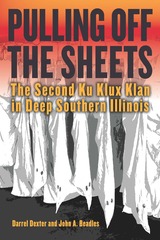Browse by Title
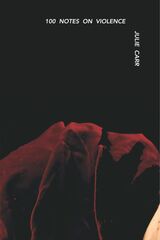
100 Notes on Violence
Julie Carr
Omnidawn, 2022
Back in print, Carr’s powerful poems seek out and face violence and its counterforces.
Julie Carr obsessively researches instances of intimate terrorism, looking everywhere from Walt Whitman and Emily Dickinson to lists of phobias and weapon-store catalogs. She searches for what can be learned from the statistics, the statements by and about rapists and killers, the websites of hate groups, and the capacity for cruelty that lies within all of us. 100 Notes on Violence is a diary, a document, and a dream log of the violence that grips America and devastates so many. But Carr also offers a layered and lyric tribute to violence’s counterforces: love, commonality, and care. Her unflinching “notes” provoke our minds and burrow into our emotions, leading us to confront our fears and our own complicity.
Julie Carr obsessively researches instances of intimate terrorism, looking everywhere from Walt Whitman and Emily Dickinson to lists of phobias and weapon-store catalogs. She searches for what can be learned from the statistics, the statements by and about rapists and killers, the websites of hate groups, and the capacity for cruelty that lies within all of us. 100 Notes on Violence is a diary, a document, and a dream log of the violence that grips America and devastates so many. But Carr also offers a layered and lyric tribute to violence’s counterforces: love, commonality, and care. Her unflinching “notes” provoke our minds and burrow into our emotions, leading us to confront our fears and our own complicity.
[more]

100 Words
Poems
Damon Potter and Truong Tran
Omnidawn, 2021
Written as a conversation, 100 Words is an exchange of ideas, dialogues, burdens, and ideals between someone White and someone Brown. Two poets, Damon Potter and Truong Tran, write to each other about one hundred powerful words—like “proximity, “shame,” and “hope”—each of which is an abstraction rife with socially inscribed beliefs and denials. They turn to each other in an exchange, a negotiation, and a series of discoveries as they write of their individual histories, share their burdens, and learn to carry weight together.
Tran explains this project, saying “it is occurring to me even as I am writing this now that this is not an experiment, or case study or collaboration or partnership. Damon is not the subject nor am I. This is a shared endeavor, a lived experience between two very different lives trying to understand what it means to be, to see the other.”
Tran explains this project, saying “it is occurring to me even as I am writing this now that this is not an experiment, or case study or collaboration or partnership. Damon is not the subject nor am I. This is a shared endeavor, a lived experience between two very different lives trying to understand what it means to be, to see the other.”
[more]
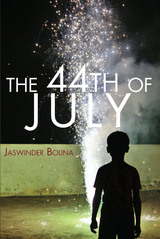
The 44th of July
Jaswinder Bolina
Omnidawn, 2019
This is a book about Americans. Not the ones brunching in Park Slope or farming in Wranglers or trading synergies in a boardroom; they are not executives or socialites. They are not the salt of the earth. Nor are they huddled masses yearning to breathe free. These are the others of the everyday, the Americans no one sees. These are the brown and bland ones who understand the good, tough money in working a double, who know which end of a joint to hit. They can find Karachi on a map. They know a shortcut to Ikea. They can land a punchline. These are their poems.
In The 44th of July, Jaswinder Bolina offers bracing and often humorous reflections on American culture through the lens of an alienated outsider at a deliberately uncomfortable distance that puts the oddities of the culture on full display. Exploring the nuances of life in an America that doesn’t treat you as one of its own, yet whose benefits still touch your life, these exquisitely crafted poems sing in a kaleidoscopic collaging of language the mundane, yet surreal experience of being in between a cultural heritage of migration and poverty and daily life in a discriminatory yet prosperous nation. Both complicit in global capitalism and victims of the inequality that makes it possible, these are the Americans who are caught in a system with no clear place for them. Bolina opens the space to include the excluded, bringing voice and embodied consciousness to experiences that are essential to Americanness, but get removed from view in the chasms between self and other, immigrant and citizen.
In The 44th of July, Jaswinder Bolina offers bracing and often humorous reflections on American culture through the lens of an alienated outsider at a deliberately uncomfortable distance that puts the oddities of the culture on full display. Exploring the nuances of life in an America that doesn’t treat you as one of its own, yet whose benefits still touch your life, these exquisitely crafted poems sing in a kaleidoscopic collaging of language the mundane, yet surreal experience of being in between a cultural heritage of migration and poverty and daily life in a discriminatory yet prosperous nation. Both complicit in global capitalism and victims of the inequality that makes it possible, these are the Americans who are caught in a system with no clear place for them. Bolina opens the space to include the excluded, bringing voice and embodied consciousness to experiences that are essential to Americanness, but get removed from view in the chasms between self and other, immigrant and citizen.
[more]
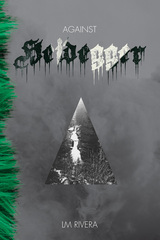
Against Heidegger
LM Rivera
Omnidawn, 2019
Attachments to proper names, traditions, and entrenched thought formations are a perennial problem and, as LM Rivera shows, an addiction. Against Heidegger is a collection of poetic meditations on that pervasive, and possibly eternal, compulsion. Rivera builds his idiosyncratically lyric argumentation against simplistic, naive, sentimental, and played-out narratives, opting instead for improvised, collaged, bursting-at-the-seams, experimental formations through which he thinks a concept through to its (im)possible end. On this philosophical-poetic journey, Rivera positions the grand figure of Martin Heidegger as a whipping boy who receives the punishment for the sins of blind tradition. Through this collection, Rivera attempts to sever many troubling yet lasting customs—be they overt, hidden, canonical, esoteric, forbidden, or blatantly authoritarian.
[more]

Anon
Steven Seidenberg
Omnidawn, 2022
Lyrical, aphoristic poems that move between forms and consider tropes of narrative.
The narrator of Anon opens the sluice gates of embittered confession and philosophical reproach to release a flood of extravagant lyricism. These poems at first submerge readers in the ecstatic rhythms of its music, then they turn to address the tropes of narrative, inviting readers to join in pursuit of major themes of the human condition.
Steven Seidenberg employs a characteristically aphoristic style to manage multiple lines of inquiry at once. The resultant fragments navigate between testament and treatise, storyline and system, and in a manner that echoes the speculative vehemence of Samuel Beckett, Clarice Lispector, and Maurice Blanchot
The narrator of Anon opens the sluice gates of embittered confession and philosophical reproach to release a flood of extravagant lyricism. These poems at first submerge readers in the ecstatic rhythms of its music, then they turn to address the tropes of narrative, inviting readers to join in pursuit of major themes of the human condition.
Steven Seidenberg employs a characteristically aphoristic style to manage multiple lines of inquiry at once. The resultant fragments navigate between testament and treatise, storyline and system, and in a manner that echoes the speculative vehemence of Samuel Beckett, Clarice Lispector, and Maurice Blanchot
[more]

b o y
Consuelo Wise
Omnidawn, 2024
A hybrid book-length poem in which the protagonist grapples with a great loss.
In this hybrid of lyric poetry and essay, Consuelo Wise utilizes repetition, fragmentation, and syntax to construct a form that repeatedly falls apart. Breaks in lines and fragmented stanzas are followed by accumulative rushes, slashes, brackets, and words pushed together.
Throughout this book-length poem, Wise composes a meditation and an investigation into loss and identity. Moving between sound and image, aggression and subtlety, b o y pries open memories that resist understanding but also refuse to be forgotten. Wise peels back layers of mourning, considering how it can be experienced as a personal, inherited, environmental, social, and historical phenomenon. Throughout, the protagonist in b o y reenvisions ways to process a great loss, listening closely and searching for words while “the earth is shaking and the silence is pressing down.”
In this hybrid of lyric poetry and essay, Consuelo Wise utilizes repetition, fragmentation, and syntax to construct a form that repeatedly falls apart. Breaks in lines and fragmented stanzas are followed by accumulative rushes, slashes, brackets, and words pushed together.
Throughout this book-length poem, Wise composes a meditation and an investigation into loss and identity. Moving between sound and image, aggression and subtlety, b o y pries open memories that resist understanding but also refuse to be forgotten. Wise peels back layers of mourning, considering how it can be experienced as a personal, inherited, environmental, social, and historical phenomenon. Throughout, the protagonist in b o y reenvisions ways to process a great loss, listening closely and searching for words while “the earth is shaking and the silence is pressing down.”
[more]

A Bead of Amber on Her Tongue
Jennifer Pullen
Omnidawn, 2019
Helen of Troy and Aphrodite: two classical paragons of beauty and love. These two figures have served as the inspiration for innumerable works of art in the Western cannon. In the twenty-first century, however, what do their stories provide but a reminder of the predictable roles which sexism has assigned women throughout history and literature?
In this fresh new take on the two women’s stories, Jennifer Pullen takes us away from the familiar and deeper into their experiences. Rewriting Homer, Pullen revitalizes these two figures for the contemporary era. In A Bead of Amber on Her Tongue, Aphrodite maintains autonomy through her experience of her own body, even when forced into marriage. Helen of Troy, meanwhile, harbors a love for her maid, Esme, that no conquering hero can vanquish. Revisiting these classic stories with an inventive twist, Pullen shows that, with a little imagination, the classics may yet bear new insights.
In this fresh new take on the two women’s stories, Jennifer Pullen takes us away from the familiar and deeper into their experiences. Rewriting Homer, Pullen revitalizes these two figures for the contemporary era. In A Bead of Amber on Her Tongue, Aphrodite maintains autonomy through her experience of her own body, even when forced into marriage. Helen of Troy, meanwhile, harbors a love for her maid, Esme, that no conquering hero can vanquish. Revisiting these classic stories with an inventive twist, Pullen shows that, with a little imagination, the classics may yet bear new insights.
[more]
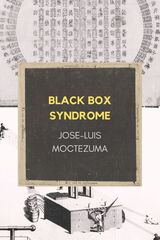
Black Box Syndrome
Jose-Luis Moctezuma
Omnidawn, 2023
Poems that follow systems of chance and divination to counter corrosive financial systems.
Jose-Luis Moctezuma’s Black Box Syndrome is a series of poems—or “black boxes”—based on black hexagrams in the I Ching, an ancient Chinese divination text. Following the aleatoric tradition popularized by the surrealists and extended by the work of John Cage and Jackson Maclow, these poems cast their lenses on the hazards of the incessant financialization of everyday life. Synthesizing chance-operational aesthetics with Aztec anatomical science, conspiracy theory with systems theory, and the black box model with the concept of the “influencing machine,” Black Box Syndrome explores tensions between lyric excess and digital compaction in the age of pandemic. Over and against the corrosive world-shrinking effects of Wall Street risk management and futures trading, the black boxes in this book propose a counter-divination that distorts, deranges, and decolonizes the logic of empire.
Jose-Luis Moctezuma’s Black Box Syndrome is a series of poems—or “black boxes”—based on black hexagrams in the I Ching, an ancient Chinese divination text. Following the aleatoric tradition popularized by the surrealists and extended by the work of John Cage and Jackson Maclow, these poems cast their lenses on the hazards of the incessant financialization of everyday life. Synthesizing chance-operational aesthetics with Aztec anatomical science, conspiracy theory with systems theory, and the black box model with the concept of the “influencing machine,” Black Box Syndrome explores tensions between lyric excess and digital compaction in the age of pandemic. Over and against the corrosive world-shrinking effects of Wall Street risk management and futures trading, the black boxes in this book propose a counter-divination that distorts, deranges, and decolonizes the logic of empire.
[more]
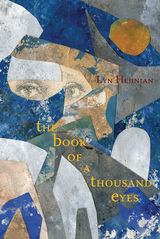
The Book of a Thousand Eyes
Lyn Hejinian
Omnidawn, 2012
Written over the course of two decades, The Book of a Thousand Eyes was begun as an homage to Scheherazade, the heroine of The Arabian Nights who, through her nightly tale-telling, saved her culture and her own life by teaching a powerful and murderous ruler to abandon cruelty in favor of wisdom and benevolence. Hejinian’s book is a compendium of “night works”—lullabies, bedtime stories, insomniac lyrics, nonsensical mumblings, fairy tales, attempts to understand at day’s end some of the day’s events, dream narratives, erotic or occasionally bawdy ditties, etc. The poems explore and play with languages of diverse stages of consciousness and realms of imagination. Though they may not be redemptive in effect, the diverse works that comprise The Book of a Thousand Eyes argue for the possibilities of a merry, pained, celebratory, mournful, stubborn commitment to life.
[more]
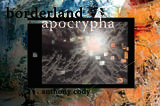
Borderland Apocrypha
Anthony Cody
Omnidawn, 2019
The 1848 Treaty of Guadalupe Hidalgo marked an end to the Mexican—American War, but it sparked a series of lynchings of Mexicans and subsequent erasures, and long-lasting traumas. This pattern of state-sanctioned violence committed towards communities of color continues to the present day. Borderland Apocrypha centers around the collective histories of these terrors, excavating the traumas born of turbulence at borderlands. In this debut collection, Anthony Cody responds to the destabilized, hostile landscapes and silenced histories of borderlands. His experimental poetic reinvents itself and shapeshifts in both form and space across the margin, the page, and the book in forms of resistance, signaling a reclamation and a re-occupation of what has been omitted. The poems ask the reader to engage in searching through the nested and cascading series of poems centered around familial and communal histories, structural racism, and natural ecosystems of borderlands. Relentless in its explorations, this collection shows how the past continues to inform actions, policies, and perceptions in North and Central America.
Rather than a proposal for re-imagining the US/Mexico border, Cody’s collection is an avant-garde examination of how borderlands have remained occupied spaces, and of the necessity of liberation to usher the earth and its people toward healing. Part auto-historia, part docu-poetic, part visual monument, part myth-making, Borderland Apocrypha unearths history in order to work toward survival, reckoning, and the building of a future that both acknowledges and moves on from tragedies of the past.
Borderland Apocrypha won Omnidawn's 2018 1st/2nd Book Prize.
Rather than a proposal for re-imagining the US/Mexico border, Cody’s collection is an avant-garde examination of how borderlands have remained occupied spaces, and of the necessity of liberation to usher the earth and its people toward healing. Part auto-historia, part docu-poetic, part visual monument, part myth-making, Borderland Apocrypha unearths history in order to work toward survival, reckoning, and the building of a future that both acknowledges and moves on from tragedies of the past.
Borderland Apocrypha won Omnidawn's 2018 1st/2nd Book Prize.
[more]

Both, Apollo
Mary Wilson
Omnidawn, 2022
A poetry collection that employs intuition, humor, and celebration while seeking to break out of restrictive social structures.
Mary Wilson’s Both, Apollo speaks from inside the bodies and binaries that so often act as constraints. It sometimes tries to negotiate its way out. It laments, celebrates, reasons, jokes, and occasionally begs. It runs into a wall and hugs it, offers it pizza, and speeds through grammars and cities until dizziness catapults it from the grid. It tries to queer the echoes of its language in the hope that a rhyme might break the logic of “either/or” and give rise to “both/and.”
Both, Apollo is a love poem to whatever has the grace to appear, quietly finding hope. Moments of humor and tenderness accompany the speaker with each act of crossing and circling back. The poems in Both, Apollo are constantly in flux, and Wilson’s lyricism acts as a teaching tool for using both the real and the imagination to guide us in moment-by-moment navigation of our world.
Both, Apollo won the Omnidawn Chapbook contest, selected by Victoria Chang.
Mary Wilson’s Both, Apollo speaks from inside the bodies and binaries that so often act as constraints. It sometimes tries to negotiate its way out. It laments, celebrates, reasons, jokes, and occasionally begs. It runs into a wall and hugs it, offers it pizza, and speeds through grammars and cities until dizziness catapults it from the grid. It tries to queer the echoes of its language in the hope that a rhyme might break the logic of “either/or” and give rise to “both/and.”
Both, Apollo is a love poem to whatever has the grace to appear, quietly finding hope. Moments of humor and tenderness accompany the speaker with each act of crossing and circling back. The poems in Both, Apollo are constantly in flux, and Wilson’s lyricism acts as a teaching tool for using both the real and the imagination to guide us in moment-by-moment navigation of our world.
Both, Apollo won the Omnidawn Chapbook contest, selected by Victoria Chang.
[more]
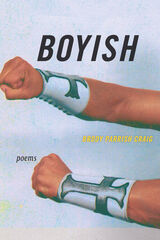
Boyish
Poems
Brody Parrish Craig
Omnidawn, 2021
The poems in Boyish reveal a reconciliation of southern and queer identities, following the poet from a Louisiana Baptist upbringing into transgender liberation. With a sense of rebellion and the revival of the hollered voice, this is an urgent narrative propelled by the necessity of upheaval, imagining what happens when we break through barriers of systemic violence and communal oppression to reconsider what could be. Boyish looks back at the status quo in order to move beyond, into a dream of a nonbinary utopia. A reckoning, this collection brings the reader along for revolution—a deep belief in possibility.
Each page builds tension that then shatters, bringing us into the interior of a story. Brody Parrish Craig invites us to carve out a space and to find ourselves carried over the gravel along the creek. Moving through the subconscious and embodied desire, these poems are rich with formal play, twisting language in dense sonnets. Landscapes of the city’s dystopia meet the queer pastoral, where conservation often means knowing what must be burned down.
Each page builds tension that then shatters, bringing us into the interior of a story. Brody Parrish Craig invites us to carve out a space and to find ourselves carried over the gravel along the creek. Moving through the subconscious and embodied desire, these poems are rich with formal play, twisting language in dense sonnets. Landscapes of the city’s dystopia meet the queer pastoral, where conservation often means knowing what must be burned down.
[more]

Call This Mutiny
[uncollected poems]
Craig Santos Perez
Omnidawn, 2024
A collection of previously published poems by renowned National Book Award-winning Chamoru poet Craig Santos Perez.
The seventh book from award-winning Chamoru author Craig Santos Perez, Call This Mutiny brings together poems that were originally published in journals and anthologies from 2008 to 2023. Throughout these selected poems, Perez offers critical explorations of native cultures, decolonial politics, colonial histories, and the entangled ecologies of his homeland of Guam, his current home of Hawaiʻi, and the larger Pacific region in relation to the Global South and the Indigenous Fourth World. Perez’s poetry draws on the power of storytelling to share Indigenous history and culture and to offer healing from the trauma of colonialism and injustice. As he writes, “If we can write the ocean, we will never be silenced.”
The seventh book from award-winning Chamoru author Craig Santos Perez, Call This Mutiny brings together poems that were originally published in journals and anthologies from 2008 to 2023. Throughout these selected poems, Perez offers critical explorations of native cultures, decolonial politics, colonial histories, and the entangled ecologies of his homeland of Guam, his current home of Hawaiʻi, and the larger Pacific region in relation to the Global South and the Indigenous Fourth World. Perez’s poetry draws on the power of storytelling to share Indigenous history and culture and to offer healing from the trauma of colonialism and injustice. As he writes, “If we can write the ocean, we will never be silenced.”
[more]
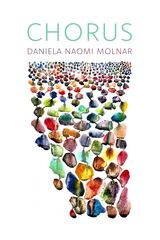
CHORUS
Daniela Naomi Molnar
Omnidawn, 2022
Poems that incorporate multiple voices to embrace fragmentation, discord, and plurality.
At a time of simultaneous isolation and interconnection, this book is an inquiry into the edges of the self. Pushing back on capitalist messages of individuality, CHORUS instead seeks the multifaceted self that engages with the radical diversity that characterizes any healthy ecosystem or society. Moving between a remote canyon in New Mexico, the Pacific Northwest, New York City, the virtual world, the past, and the unstable future, the author asks, “Whose afterimage am I?”
The sprawling, celebratory, mourning chorus of this book is the sum of many voices; the words of other writers, poets, and artists are interwoven with the author’s words. This is a celebration of language’s capacity to supersede bodily limits, mortality, and existential loneliness. Daniela Naomi Molnar’s chorus encompasses violence, love, empathy, fear, a burning planet, a pandemic, heartbreak, desire, joy, and grief. Rather than seeking resolution, these poems look through the lens of a fragmented self, dwelling in plurality, discord, and harmony.
CHORUS is the winner of Omnidawn’s 1st /2nd Book Prize, judged by Kazim Ali.
At a time of simultaneous isolation and interconnection, this book is an inquiry into the edges of the self. Pushing back on capitalist messages of individuality, CHORUS instead seeks the multifaceted self that engages with the radical diversity that characterizes any healthy ecosystem or society. Moving between a remote canyon in New Mexico, the Pacific Northwest, New York City, the virtual world, the past, and the unstable future, the author asks, “Whose afterimage am I?”
The sprawling, celebratory, mourning chorus of this book is the sum of many voices; the words of other writers, poets, and artists are interwoven with the author’s words. This is a celebration of language’s capacity to supersede bodily limits, mortality, and existential loneliness. Daniela Naomi Molnar’s chorus encompasses violence, love, empathy, fear, a burning planet, a pandemic, heartbreak, desire, joy, and grief. Rather than seeking resolution, these poems look through the lens of a fragmented self, dwelling in plurality, discord, and harmony.
CHORUS is the winner of Omnidawn’s 1st /2nd Book Prize, judged by Kazim Ali.
[more]
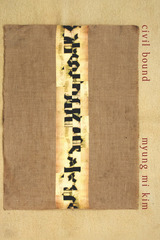
Civil Bound
Myung Mi Kim
Omnidawn, 2019
In Civil Bound, Myung Mi Kim turns a keen ear to language as the mechanism by which society operates. The poems engage multiple methods to make sense of this pervasive tool, its powers, nuances, and influences over the structure of our civilizations. Through investigations of ecology, capitalism, military powers, colonialism, and supremacy, the book uncovers patterns in the ways that language is active in perpetuating inequality and binding its subjects to the will of those in positions of authority. In questioning systems of oppression, the poems also offer the hope of forging new paths through the connecting power of language. Examining our participation in social contracts, communal goals, and human desires, Kim’s poems encourage us to salvage language as a means of connection that binds us in respect and commitment to our fellow human beings.
[more]
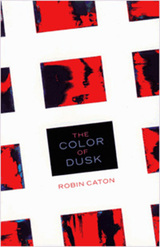
The Color of Dusk
Robin Caton
Omnidawn, 2001
In The Color of Dusk, Robin Caton bridges traditions of secular, religious, modernist, and post modernist writing to encounter word at its most unsettling, provocative, and urgent. At times conversational, elliptic, meditative, minimalist, expansive, Caton's poems are unified by an insistence to reach, with language, through language, to turn words toward what is ever outside their ability to name.
[more]
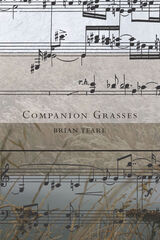
Companion Grasses
Brian Teare
Omnidawn, 2013
What does it mean to dwell in a place? These adventurous poems go on foot in search of answers. Walking the cities, coasts, forests and mountains of Northern California and New England, they immerse themselves in the specifics of bioregion and microclimate, and take special note of the cycle of death and rebirth that plays out dramatically in California’s chaparral and grasslands. Inspired by Transcendentalism, Companion Grasses sees the sacred in the workings of the material world, but its indebtedness to the ecological tradition of California poets like Gary Snyder and Brenda Hillman means that it also unearths such evidence in the sensual materiality of words themselves. Both ecologically rich landscapes and highly rhythmic inscapes, these poems set seasonal and human dramas side-by-side, wresting an original, signature music from the meeting of site and sight. In pursuing an aesthetics situated in place, they compose an ethics of what it means to be a human companion to the natural world: “What we love, how we care for it,/is where we live.”
[more]
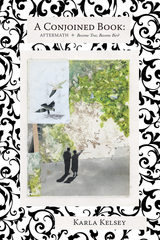
A Conjoined Book
Aftermath and Become Tree, Become Bird
Karla Kelsey
Omnidawn, 2014
Karla Kelsey’s A Conjoined Book hinges together two texts—Aftermath and Become Tree, Become Bird—to create a meditation on the nature of aboutness. Aftermath unfolds after an unnamed ecological/emotional fracture, creating a landscape of rift where the “I” imagines herself as “she,” and perceptions weave into memory and fiction. Become Tree, Become Bird grafts the Brothers Grimm’s The Juniper Tree to the body of Aftermath, reworking what has splintered into a variation of fairy tale. Throughout A Conjoined Book, Kelsey’s condensed imagery, shifting viewpoints, and interwoven formal structures set lyric and narrative a-shimmer. Blending experiment and tradition, this book will appeal to a wide audience interested in seeing how fairy tale, philosophy, ecology, narratology, history. As Julie Carr writes: “horror, elegy, mystery, fairy tale, lyric, treatise, fragment meet one another with all their intensities of emotion and intellect.”
[more]
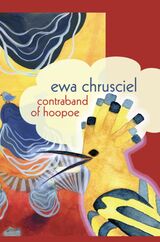
Contraband of Hoopoe
Ewa Chrusciel
Omnidawn, 2014
Contraband of Hoopoe explores issues of dislocation, immigration and desire. Chrusciel invents a poetics of smuggling as she crosses national, historical and linguistic borders. The migratory narrative is distinctly errant, haunted by a childhood lived under a Communist regime, by the austerity of Eastern block politics, and by the possibility of discovering a fleeting language to carry the seeds of illicit revelation, spiritual transformation, and insight. The book elevates smuggling to a noble art, recording how the Jewish people were hidden and transported during the Holocaust. Chrusciel tracks a series of historical objects and secret messages that immigrants throughout history have been sneaking through customs, past border checkpoints, and across the seas.
[more]
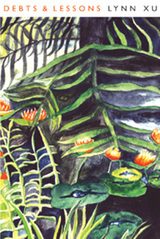
Debts & Lessons
Lynn Xu
Omnidawn, 2013
The poems in Lynn Xu’s striking debut collection, Debts & Lessons, travel under the power of history’s illusory engine and echo its ululations of love, violence, and lament. Named after the first part of Marcus Aurelius’s Meditations, this book also finds its way across oceans and between languages, as the poet looks to the dead for guidance amid the abstractions of contemporary life. Xu pays her phantoms (and her readers) with the dream-currency of hallucinatory songs, which balance her finely-tuned ear against a world of awakenings.
[more]

Devonte Travels the Sorry Route
T.J. Anderson III
Omnidawn, 2019
Devonte, the eponymous subject of the poems in Devonte Travels the Sorry Route, has a gift: he can travel across space and time. This extraordinary quality brings Devonte into contact with a broad array of events and phenomena from black history and culture. Unlike most of us, who perceive of history as a sequence of fleeting events, Devonte is able to experience all of his diverse travels to varied historical epochs and places simultaneously, and in doing so is able to become a “stalker of history,” chasing down the elusive narratives that have been erased or ignored by the building of empires and the destruction of ecosystems.
As fantastical as this account seems, in these poems, T.J. Anderson III captures a critical aspect of the ways identity is formed through community and collective memory, particularly among the peoples of the African diaspora. The way the words expand across the page enacts this polyvocal coalescing, and the blank space in between evokes the vast oceans that first separated and continue to resonate in the collective imagination of the Black community. At the same time that he relates the difficulty of crossing vast expanses of time and space to connect with our history, in these gripping poems Anderson proposes that the past is never far off—in fact, like Devonte, it lives in our own personalities and experiences today.
As fantastical as this account seems, in these poems, T.J. Anderson III captures a critical aspect of the ways identity is formed through community and collective memory, particularly among the peoples of the African diaspora. The way the words expand across the page enacts this polyvocal coalescing, and the blank space in between evokes the vast oceans that first separated and continue to resonate in the collective imagination of the Black community. At the same time that he relates the difficulty of crossing vast expanses of time and space to connect with our history, in these gripping poems Anderson proposes that the past is never far off—in fact, like Devonte, it lives in our own personalities and experiences today.
[more]
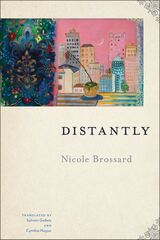
Distantly
Nicole Brossard
Omnidawn, 2022
A bilingual collection of poems that offers a surreal perspective of urban experience.
This bilingual edition of Nicole Brossard’s lyrical poetry is a sequence of lush, taut cityscapes. Known for her elliptical and materially grounded poetics, Brossard creates an intimate series of poems drawn loosely from urban experience. The poems comprise an evocative distillation of postmodern urban life with a sharp sense of cultural and gendered histories of violence and beauty and struggles for survival and intimacy. The poems capture the emotional and ecological surroundings of each city and its people. The cities in Brossard’s poems feel surreal and in them dwell survivors of “misfortunes,” living in urban landscapes with their “gleaming debris” and “bridges, ghats, / rivers in a time of peace and torture.” These poems gesture toward a transmuted social context and toward a quest “to meet the horizon the day after the horizon.”
This bilingual edition of Nicole Brossard’s lyrical poetry is a sequence of lush, taut cityscapes. Known for her elliptical and materially grounded poetics, Brossard creates an intimate series of poems drawn loosely from urban experience. The poems comprise an evocative distillation of postmodern urban life with a sharp sense of cultural and gendered histories of violence and beauty and struggles for survival and intimacy. The poems capture the emotional and ecological surroundings of each city and its people. The cities in Brossard’s poems feel surreal and in them dwell survivors of “misfortunes,” living in urban landscapes with their “gleaming debris” and “bridges, ghats, / rivers in a time of peace and torture.” These poems gesture toward a transmuted social context and toward a quest “to meet the horizon the day after the horizon.”
[more]
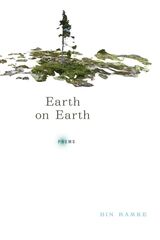
Earth on Earth
Bin Ramke
Omnidawn, 2021
Poems that personally engage with the materiality and danger of earth.
A kind of translation of the thousand-year-old poem “Earth Took of Earth,” this book is an attempt to restate in personal, emotional terms a sense of both the danger of and the consolation given by earth itself. Many of these poems arose during a collaboration with the ecologist-ceramicist Mia Mulvey: her work with earth, clay often extruded through digitally guided machinery, echoes Ramke’s attempts to understand damages done to and celebrate the facts of earth—for instance, that geosmin, the scent of wet soil, is so powerfully recognizable even in trace amounts. The title of this book is also a play on the phrase “heaven on earth,” turning this idea around and encouraging us to instead turn our hopes toward earth on earth.
A kind of translation of the thousand-year-old poem “Earth Took of Earth,” this book is an attempt to restate in personal, emotional terms a sense of both the danger of and the consolation given by earth itself. Many of these poems arose during a collaboration with the ecologist-ceramicist Mia Mulvey: her work with earth, clay often extruded through digitally guided machinery, echoes Ramke’s attempts to understand damages done to and celebrate the facts of earth—for instance, that geosmin, the scent of wet soil, is so powerfully recognizable even in trace amounts. The title of this book is also a play on the phrase “heaven on earth,” turning this idea around and encouraging us to instead turn our hopes toward earth on earth.
[more]
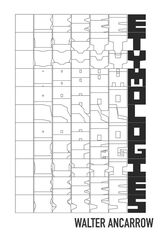
Etymologies
Walter Ancarrow
Omnidawn, 2023
A poetry collection that playfully questions the meanings of words.
Walter Ancarrow’s collection Etymologies considers language as a process, rather than as a singular fixed history. These poems build imaginative worlds with a variety of creative word uses. They form a playful amalgamation of linguistic interpretations that flips and questions conventional narratives about word origins—including the idea that clear origins even exist. Throughout the collection, Ancarrow questions the intent of writers who use etymology in attempts to prove a specific meaning for any word. In so doing, Etymologies pays particular attention to relationships between the cultures and conflicts, the migrations and hegemonies, that create our words, and it considers how their meanings are furthered by us as we keep them alive through speech.
Etymologies won Omnidawn’s 2021 Open Poetry Book Prize, selected by John Yau.
Walter Ancarrow’s collection Etymologies considers language as a process, rather than as a singular fixed history. These poems build imaginative worlds with a variety of creative word uses. They form a playful amalgamation of linguistic interpretations that flips and questions conventional narratives about word origins—including the idea that clear origins even exist. Throughout the collection, Ancarrow questions the intent of writers who use etymology in attempts to prove a specific meaning for any word. In so doing, Etymologies pays particular attention to relationships between the cultures and conflicts, the migrations and hegemonies, that create our words, and it considers how their meanings are furthered by us as we keep them alive through speech.
Etymologies won Omnidawn’s 2021 Open Poetry Book Prize, selected by John Yau.
[more]
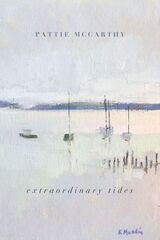
extraordinary tides
Pattie McCarthy
Omnidawn, 2023
A poetry chapbook that reflects on shifting time and tides through the language of the shoreline.
Pattie McCarthy’s extraordinary tides occupies a space in the intertidal, the in-between place of not-quite-land and not-quite-sea. The poems reflect on passing time, fluctuating tides, and on our efforts to predict both. Upon a ground that is always in flux beneath us, McCarthy invites us to question if and how we really know where we are. Considering the language of the tides, the poems in this chapbook make a wrackline palimpsest, a seastruck archive, a marginalia of the littoral.
McCarthy's extraordinary tides is the winner of the 2021 Omnidawn Poetry Chapbook Contest, chosen by Rae Armantrout.
Pattie McCarthy’s extraordinary tides occupies a space in the intertidal, the in-between place of not-quite-land and not-quite-sea. The poems reflect on passing time, fluctuating tides, and on our efforts to predict both. Upon a ground that is always in flux beneath us, McCarthy invites us to question if and how we really know where we are. Considering the language of the tides, the poems in this chapbook make a wrackline palimpsest, a seastruck archive, a marginalia of the littoral.
McCarthy's extraordinary tides is the winner of the 2021 Omnidawn Poetry Chapbook Contest, chosen by Rae Armantrout.
[more]
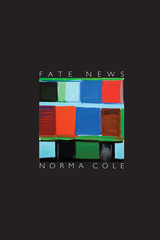
Fate News
Norma Cole
Omnidawn, 2018
All timing all the time! Fate News is poetry in the crosshairs of action (kairos) and clock time (chronos). With a topical setlist in four sections, “Local,” “On-Going,” “Stay Songs,” and “Harmolodics,” Fate News relentlessly pierces the surface of lyric gesture. Its osmotic exchanges and searching encounters vibrate with the clarity of fiercely delicate shouts and murmurs, undertones and overtones. The vision of “Mount Fiasco” is on fire.
[more]
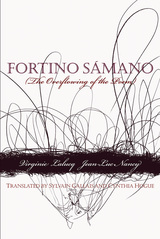
Fortino Sámano
The Overflowing of the Poem
Virginie Lalucq and Jean-Luc Nancy
Omnidawn, 2012
Fortino Sámano (the overflowing of the poem), translated by Cynthia Hogue and Sylvain Gallais, with French on facing pages, is a collaborative work by the emerging French poet, Virginie Lalucq, and the distinguished philosopher, Jean-Luc Nancy. Lalucq wrote the serial poem, Fortino Sámano, after seeing an exhibit of photographs on the Mexican Revolution by Agustin Victor Casasola. Her series is a meditation on the single, extant photograph of Sámano, a Zapatista lieutenant and counterfeiter, which Casasola snapped as Sámano, smoking a last cigar, appeared to stare death nonchalantly in the face moments before his execution by firing squad (it was reported that he himself gave the order to fire). Little is known about Sámano, and Lalucq’s poem makes no attempt to be biographical or historical. Rather, she treats the image itself, the fact that the camera caught the image of life just prior to its end. What, then, does the image represent? She asks. Nancy’s section, Les débordements du poème (The overflowing of the poem), is a series of poetic commentaries on each of the poems in Lalucq’s series. It is a philosophical contemplation of the specific poem, Fortino Sámano, and also, a poetic investigation of the lyric genre, which works hand-in-hand with Lalucq’s poems. Fortino Sámano is an exciting poetic dialogue, and a significant work in poetics, which Hogue and Gallais have brought into English.
[more]
![front cover of from unincorporated territory [guma’]](https://www.bibliovault.org/thumbs/978-1-890650-91-9-thumb.jpg)
from unincorporated territory [guma’]
Craig Santos Perez
Omnidawn, 2014
Craig Santos Perez, a native Chamoru from the Pacific Island of Guåhan (Guam), has lived for two decades away from his homeland. This new collection maps the emotional and geographic cartographies of his various migrations, departures, and arrivals. Through a variety of poetic forms, the poet highlights the importance of origins and customs amidst new American cultures and terrains. Furthermore, this book draws attention to, and protests, the violent currents of colonialism and militarism currently threatening Guåhan, a “strategic” US territory since 1898. The poet memorializes what his people have lost and insists that we must protect and defend what we have left of home. This collection will engage those interested in Pacific literature, multicultural, indigenous poetry, mixed-genre, multilingual experiments, ecopoetics, and those who want to explore intersections between poetry, politics, history, and culture.
[more]
![front cover of from unincorporated territory [hacha]](https://www.bibliovault.org/thumbs/978-1-63243-049-6-thumb.jpg)
from unincorporated territory [hacha]
Craig Santos Perez
Omnidawn, 2017
from unincorporated territory [hacha] is the first book of native Chamorro poet Craig Santos Perez’s ongoing series about his homeland, the Western Pacific Island of Guåhan (Guam). Perez weaves avant-garde, eco-poetic, indigenous, documentary, multilingual, and abstract expressionist modes to tell the complex story of Guam’s people, culture, history, politics, and ecologies. Since its original publication in 2008, [hacha] has received positive reviews, and it has been taught in universities throughout Asia, the Pacific, the United States, Canada, and Europe. This new and revised edition aims to bring the book to a new generation of readers.
[more]
![front cover of from unincorporated territory [lukao]](https://www.bibliovault.org/thumbs/978-1-63243-041-0-thumb.jpg)
from unincorporated territory [lukao]
Craig Santos Perez
Omnidawn, 2017
from unincorporated territory [lukao] is the fourth book in native Chamorro poet Craig Santos Perez’s ongoing series about his homeland, the Western Pacific Island of Guåhan (Guam), and his current home, Hawai?i. He utilizes eco-poetic, decolonial, diasporic, indigenous, documentary, epic, and avant-garde modes to weave stories of creation, birth, migration, food sovereignty, and parenting. This work not only protests the devastating impacts of colonialism, militarism, and environmental injustice across the Pacific, it also expresses a vision of a sustainable and hopeful future.
[more]
![front cover of from unincorporated territory [saina]](https://www.bibliovault.org/thumbs/978-1-890650-46-9-thumb.jpg)
from unincorporated territory [saina]
Craig Santos Perez
Omnidawn, 2010
With the Saina as his figurative vessel—a ship built in modern times as an exact replica of the swift outriggers designed and sailed by the Chamorro people until banned by their oppressors—Craig Santos Perez deftly navigates the complexities in his bracing exploration of the personal, historical, cultural, and natural elements of his native Guam and its people. As the title—from unincorporated territory [saina]—suggests, by understanding where we are from, we can best determine where we are going. Perez collages primary texts and oral histories of the colonial domination and abuse brought by the Spanish, the Japanese, the United States, and the capitalist entertainment/travel industry, with intimate stories of his childhood experiences on Guam, his family’s immigration to the US, and the evocatively fragmentary myths of his ancestors. Resonant too in Perez’s title, and throughout this work, is this poet’s evocation of the unincorporated and unfathomed elements of our natures, as he seeks the means to access an expansiveness that remains inexpressible in any language. Perez is not afraid to press language beyond the territories of ‘the known’ as he investigates both the anguish and the possibilities that horizon as one attempts to communicate the spoken and unspoken languages of one’s native people, while fully appreciating the suffering inherent in every word he will use that is pronounced in, and thus pronounces, the language of their oppressors.
[more]
![front cover of From Unincorporated Territory [åmot]](https://www.bibliovault.org/thumbs/978-1-63243-118-9-thumb.jpg)
From Unincorporated Territory [åmot]
Craig Santos Perez
Omnidawn, 2023
Winner of the National Book Award for Poetry, this collection of experimental and visual poems dives into the history and culture of the poet’s homeland, Guam.
This book is the fifth collection in Craig Santos Perez’s ongoing from unincorporated territory series about the history of his homeland, the western Pacific island of Guåhan (Guam), and the culture of his indigenous Chamoru people. “Åmot” is the Chamoru word for “medicine,” commonly referring to medicinal plants. Traditional Chamoru healers were known as yo’åmte; they gathered åmot in the jungle and recited chants and invocations of taotao’mona, or ancestral spirits, in the healing process.
Through experimental and visual poetry, Perez explores how storytelling can become a symbolic form of åmot, offering healing from the traumas of colonialism, militarism, migration, environmental injustice, and the death of elders.
This book is the fifth collection in Craig Santos Perez’s ongoing from unincorporated territory series about the history of his homeland, the western Pacific island of Guåhan (Guam), and the culture of his indigenous Chamoru people. “Åmot” is the Chamoru word for “medicine,” commonly referring to medicinal plants. Traditional Chamoru healers were known as yo’åmte; they gathered åmot in the jungle and recited chants and invocations of taotao’mona, or ancestral spirits, in the healing process.
Through experimental and visual poetry, Perez explores how storytelling can become a symbolic form of åmot, offering healing from the traumas of colonialism, militarism, migration, environmental injustice, and the death of elders.
[more]
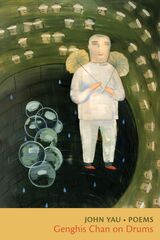
Genghis Chan on Drums
John Yau
Omnidawn, 2021
A diverse and cacophonous poetry collection tackling subjects from identity to current events.
At once comic and cantankerous, tender and discomfiting, piercing and irreverent, Genghis Chan on Drums is a shape-shifting book of percussive poems dealing with aging, identity, PC culture, and stereotypes about being Chinese. Employing various forms, John Yau’s poems traverse a range of subjects, including the 1930s Hollywood actress Carole Lombard, the Latin poet Catullus, the fantastical Renaissance painter Piero di Cosimo’s imaginary sister, and a nameless gumshoe. Yau moves effortlessly from using the rhyme scheme of a sixteenth-century Edmund Spenser sonnet to riffing on a well-known poem-rant by the English poet Sean Bonney, and to immersing himself in the words of condolence sent by a former president to the survivors of a school massacre. Yau’s poems are conduits through which many different, conflicting, and unsavory voices strive to be heard.
At once comic and cantankerous, tender and discomfiting, piercing and irreverent, Genghis Chan on Drums is a shape-shifting book of percussive poems dealing with aging, identity, PC culture, and stereotypes about being Chinese. Employing various forms, John Yau’s poems traverse a range of subjects, including the 1930s Hollywood actress Carole Lombard, the Latin poet Catullus, the fantastical Renaissance painter Piero di Cosimo’s imaginary sister, and a nameless gumshoe. Yau moves effortlessly from using the rhyme scheme of a sixteenth-century Edmund Spenser sonnet to riffing on a well-known poem-rant by the English poet Sean Bonney, and to immersing himself in the words of condolence sent by a former president to the survivors of a school massacre. Yau’s poems are conduits through which many different, conflicting, and unsavory voices strive to be heard.
[more]
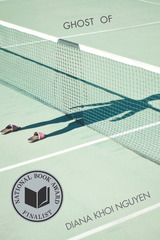
Ghost Of
Diana Khoi Nguyen
Omnidawn, 2018
Ghost Of is a mourning song, not an exorcism or un-haunting of that which haunts, but attuned attention, unidirectional reaching across time, space, and distance to reach loved ones, ancestors, and strangers. By working with, in, and around the photographs that her brother left behind (from which he cut himself out before his death), Nguyen wrestles with what remains: memory, physical voids, and her family captured around an empty space.
[more]
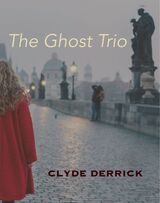
The Ghost Trio
Clyde Derrick
Omnidawn, 2022
A story set in Prague that crosses the lines between the living and the dead.
The great love of your life is dead, but that doesn’t stop him from communicating with you—or luring you to join him in the afterlife. To remain safe in this world, you accept the help of a professional medium who develops his own emotional agenda.
The Ghost Trio that emerges takes us to pre- and post-World War II Prague where a poignant and chilling love triangle finds its resolution. There we meet great Czech creators of the past including Leoš Janácek and Karel Capek. Inspired by the ghost stories of Henry James and Daphne du Maurier, Clyde Derrick introduces three characters whose passions defy time and the accepted boundaries between the dead and the living. The author, who has lived in and visited purportedly haunted sites in advance of writing this novella, contends that this story and its characters found him. Meanwhile, his portrayal of two Pragues—one poised to fall to Hitler’s army, the other muted by Communist oppression—offers us insights into the past and reminds us to stay vigilant against dangerous politics. The Ghost Trio is a spiritual excursion in which we ponder the limitations and hazards of romantic love as well as the possibility of other lives in other times.
The Ghost Trio is the winner of the 2020 Omnidawn Fabulist Fiction Chapbook / Novelette Contest, chosen by Molly Gloss.
The great love of your life is dead, but that doesn’t stop him from communicating with you—or luring you to join him in the afterlife. To remain safe in this world, you accept the help of a professional medium who develops his own emotional agenda.
The Ghost Trio that emerges takes us to pre- and post-World War II Prague where a poignant and chilling love triangle finds its resolution. There we meet great Czech creators of the past including Leoš Janácek and Karel Capek. Inspired by the ghost stories of Henry James and Daphne du Maurier, Clyde Derrick introduces three characters whose passions defy time and the accepted boundaries between the dead and the living. The author, who has lived in and visited purportedly haunted sites in advance of writing this novella, contends that this story and its characters found him. Meanwhile, his portrayal of two Pragues—one poised to fall to Hitler’s army, the other muted by Communist oppression—offers us insights into the past and reminds us to stay vigilant against dangerous politics. The Ghost Trio is a spiritual excursion in which we ponder the limitations and hazards of romantic love as well as the possibility of other lives in other times.
The Ghost Trio is the winner of the 2020 Omnidawn Fabulist Fiction Chapbook / Novelette Contest, chosen by Molly Gloss.
[more]
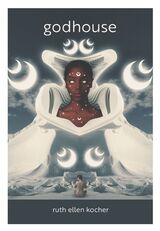
godhouse
Ruth Ellen Kocher
Omnidawn, 2023
Poems that consider the human body as a meeting place of the infinite and the mortal.
Starting with the idea that the human experience is the universe looking back at itself, godhouse takes the notion a few steps further by centering cosmology within a raced and gendered body. Ruth Ellen Kocher’s poems envision this body as a union of god and soul that, within our material world, encompasses love and hate, joy and despair. The body is a site of divine presence made mortal, electrified with the resonance of both the infinite and the human. In godhouse, we encounter the body as a site where the universe is made personal and celebratory, where the celestial endure the complications of flesh and friction forms between the glorious and the monstrous aspects of personhood.
Starting with the idea that the human experience is the universe looking back at itself, godhouse takes the notion a few steps further by centering cosmology within a raced and gendered body. Ruth Ellen Kocher’s poems envision this body as a union of god and soul that, within our material world, encompasses love and hate, joy and despair. The body is a site of divine presence made mortal, electrified with the resonance of both the infinite and the human. In godhouse, we encounter the body as a site where the universe is made personal and celebratory, where the celestial endure the complications of flesh and friction forms between the glorious and the monstrous aspects of personhood.
[more]
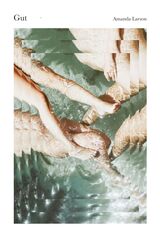
Gut
Amanda Larson
Omnidawn, 2021
These poems follow the aftermath of and recovery from trauma.
Amanda Larson’s Gut begins with an epigraph from Frank O’Hara: “Pain always produces logic, which is very bad for you.” From there, Larson launches an unflinching interrogation of how a young woman maintains agency in the wake of trauma, violence, and desire. Larson spins a conversation between works of feminist theory—including the those of Cathy Caruth, Susan Bordo, Patricia Hill Collins, Anne Carson, Hélène Cixous, and bell hooks—and her own experiences. The book moves through Larson’s recovery while questioning the limits of the very term and of language as a whole. She employs a variety of different forms, including prose, Q&A poems, and a timeline, reflecting both the speaker’s obsession with control and her growing willingness to let it go. With a measured voice, Larson finds a path for how to move beyond logic during processes of trauma and recovery.
Gut won the Omnidawn 1st/2nd Book Contest, selected by Jericho Brown.
Amanda Larson’s Gut begins with an epigraph from Frank O’Hara: “Pain always produces logic, which is very bad for you.” From there, Larson launches an unflinching interrogation of how a young woman maintains agency in the wake of trauma, violence, and desire. Larson spins a conversation between works of feminist theory—including the those of Cathy Caruth, Susan Bordo, Patricia Hill Collins, Anne Carson, Hélène Cixous, and bell hooks—and her own experiences. The book moves through Larson’s recovery while questioning the limits of the very term and of language as a whole. She employs a variety of different forms, including prose, Q&A poems, and a timeline, reflecting both the speaker’s obsession with control and her growing willingness to let it go. With a measured voice, Larson finds a path for how to move beyond logic during processes of trauma and recovery.
Gut won the Omnidawn 1st/2nd Book Contest, selected by Jericho Brown.
[more]
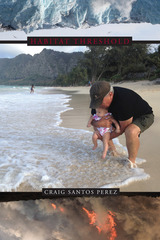
Habitat Threshold
Craig Santos Perez
Omnidawn, 2019
With Habitat Threshold, Craig Santos Perez has crafted a timely collection of eco-poetry that explores his ancestry as a native Pacific Islander, the ecological plight of his homeland, and his fears for the future. The book begins with the birth of the author’s daughter, capturing her growth and childlike awe at the wonders of nature. As it progresses, Perez confronts the impacts of environmental injustice, the ravages of global capitalism, toxic waste, animal extinction, water rights, human violence, mass migration, and climate change. Throughout, he mourns lost habitats and species, and confronts his fears for the future world his daughter will inherit. Amid meditations on calamity, this work does not stop at the threshold of elegy. Instead, the poet envisions a sustainable future in which our ethics are shaped by the indigenous belief that the earth is sacred and all beings are interconnected—a future in which we cultivate love and “carry each other towards the horizon of care.”
Through experimental forms, free verse, prose, haiku, sonnets, satire, and a method he calls “recycling,” Perez has created a diverse collection filled with passion. Habitat Threshold invites us to reflect on the damage done to our world and to look forward, with urgency and imagination, to the possibility of a better future.
Through experimental forms, free verse, prose, haiku, sonnets, satire, and a method he calls “recycling,” Perez has created a diverse collection filled with passion. Habitat Threshold invites us to reflect on the damage done to our world and to look forward, with urgency and imagination, to the possibility of a better future.
[more]
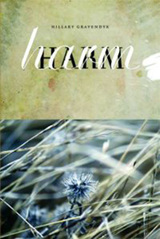
Harm
Hillary Gravendyk
Omnidawn, 2012
Offering a new narrative of physical body constituted in perilous scenes of contact, Harm performs the loss of that fictive division between a unified body and its surrounding world. Terrifying and unlooked- for harmonies emerge in these poems, which dwell in a medicalized landscape where both the body and the land are monitored and laid bare. Troubling the idea of cure by recasting it in the terms of harm, Harm shifts between warning and error, nature and the body. In the sense of Baudelaire’s “correspondences,” bloodclots externalize into “sunclots” and the air is “rusty with blood.” The book troubles the idea of cure by casting it also as a form of harm itself. Moving amid the prose poem and the lyric, Harm navigates a landscape of extremity both frightening and filled with wonders.
[more]
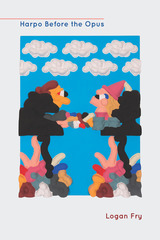
Harpo Before the Opus
Logan Fry
Omnidawn, 2019
The poems begin where language fails, where speech becomes disembodied, and syntax skids to a stop that dissolves into gesture. Where its form reaches an end, formlessness offers a space ripe with possibility. Here we find Harpo, reaching into the frustrated endpoint of language to find a method for its resurrection. Fry sees that language becomes a tool for alienation and uses the poems in Harpo Before the Opus to excavate paths back to tenderness. These are poems from the edge, pulling language out from its failure and into a fervent interrogation of its possibilities. What was once a tool of capitalistic alienation now serves as material for building connections.
In spiraling explorations of rhetoric, these poems allow language to break from its prescribed structures, and instead, it becomes a gestural embrace of feeling and being. Fry utilizes a Marxist lens to scrutinize and reinvent the use of language. In Fry’s hands, language is rendered a visceral and sensual material, forming poems that are both deeply felt philosophical inquiries and wildly playful exercises of wit.
In spiraling explorations of rhetoric, these poems allow language to break from its prescribed structures, and instead, it becomes a gestural embrace of feeling and being. Fry utilizes a Marxist lens to scrutinize and reinvent the use of language. In Fry’s hands, language is rendered a visceral and sensual material, forming poems that are both deeply felt philosophical inquiries and wildly playful exercises of wit.
[more]
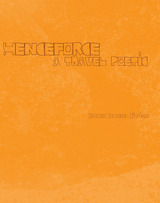
henceforce
A Travel Poetic
Kamden Ishmael Hilliard
Omnidawn, 2019
In henceforce, Kamden Ishmael Hilliard’s poems take us on unimaginable voyages within and beyond the contours of our quotidian experience. This is not simply geographic travel, however: though Hilliard’s poems explore air travel, transcontinental locations, and even intergalactic scenes, their travel poetic asks us to move through and beyond deeply entrenched social boundaries. The movement depicted and encouraged here brings the reader into contact with figures that destabilize our notions of race, gender, and nation. Hilliard’s language, too, transgresses boundaries. For any reader who loves strange encounters with the familiar and the thrill of disorientation, these poems will prove challenging in a deeply exhilarating way, asking the reader to question the limits of their gaze, their language, their sense of place, and ultimately to reaffirm their personhood.
[more]
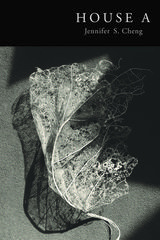
House A
Jennifer S. Cheng
Omnidawn, 2016
House A investigates the tones and textures of immigrant home-building by asking: How is the body inscribed with a cosmology of home, and vice versa? With evocative and intellectual precision, House A weaves personal, discursive, and lyrical textures to invoke the immersive-obscured experience of an immigrant home’s entanglement while mapping a new poetics of American Home, steeped in longing and rooted by displacement.
[more]
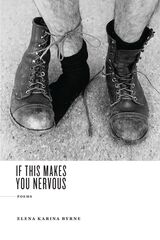
If This Makes You Nervous
Elena Karina Byrne
Omnidawn, 2021
Lyrical narrative poetry that responds to works of art.
Elena Karina Byrne’s fourth collection of poems offers what she describes as an homage to her art-immersed upbringing with poems that challenge perception as they create a dialogue between the speaker and sixty-six artists. Lyrical narratives unfold with psychological urgency and candor as they re-encounter each artist’s unique oeuvre. The poems are as political as they are personal, mapping out the author’s emotional, spatial, and gender orientations within the confines of our visual culture.
Longing and loss prevail in If This Makes You Nervous, always leading the reader on winding paths that return to the bodily while balancing beauty and terror and what is seen and what remains invisible. If This Makes You Nervous is a devotional look at shifting identity that begins in a preteen’s memory, moves through history’s collective body, and ends with what is “connected and accounted for” in the imagination’s relativistic measure of time.
Elena Karina Byrne’s fourth collection of poems offers what she describes as an homage to her art-immersed upbringing with poems that challenge perception as they create a dialogue between the speaker and sixty-six artists. Lyrical narratives unfold with psychological urgency and candor as they re-encounter each artist’s unique oeuvre. The poems are as political as they are personal, mapping out the author’s emotional, spatial, and gender orientations within the confines of our visual culture.
Longing and loss prevail in If This Makes You Nervous, always leading the reader on winding paths that return to the bodily while balancing beauty and terror and what is seen and what remains invisible. If This Makes You Nervous is a devotional look at shifting identity that begins in a preteen’s memory, moves through history’s collective body, and ends with what is “connected and accounted for” in the imagination’s relativistic measure of time.
[more]

Impastoral
Brandan Griffin
Omnidawn, 2022
Poems that blur the boundaries of language and species, inviting us to imagine a new world.
The expansive reworking of language in Impastoral flies through the possible voices of outsides and insides—slug, probe, horse carriage, sewer, potted plant, lab rat, vampire, bot fly, giant cow. Language, in Brandan Griffin’s poetry, is neither human nor nonhuman, and it undoes that very idea of these distinctions, so beings—slugprobe, pottedhorsesewer, telepathybarcode, mammaltexts—morph and change in between boundaries.
Each of these poems is an organism, a collection of living connections, looped interiorities strung together in worlds tunneling through worlds. The poems’ composition becomes a decomposition of budding, breeding, and fluctuating. Reading this collection is an experience of becoming deformed and merged into the experiences of other beings; you are sea vent, microprocessor, cell gel, bug, a greenly translucent leaf typed half a sound at a time. Griffin invites us to imagine all possible beings and to hatch into a fresh world.
Impastoral won the Omnidawn Open Book contest, selected by Brian Teare.
The expansive reworking of language in Impastoral flies through the possible voices of outsides and insides—slug, probe, horse carriage, sewer, potted plant, lab rat, vampire, bot fly, giant cow. Language, in Brandan Griffin’s poetry, is neither human nor nonhuman, and it undoes that very idea of these distinctions, so beings—slugprobe, pottedhorsesewer, telepathybarcode, mammaltexts—morph and change in between boundaries.
Each of these poems is an organism, a collection of living connections, looped interiorities strung together in worlds tunneling through worlds. The poems’ composition becomes a decomposition of budding, breeding, and fluctuating. Reading this collection is an experience of becoming deformed and merged into the experiences of other beings; you are sea vent, microprocessor, cell gel, bug, a greenly translucent leaf typed half a sound at a time. Griffin invites us to imagine all possible beings and to hatch into a fresh world.
Impastoral won the Omnidawn Open Book contest, selected by Brian Teare.
[more]

Interventions for Women
Angela Hume
Omnidawn, 2021
Poems that address cultural pressures placed on women and girls.
This is a book for those who were raised to be girls and expected to become women, for those who were told they were too girly and not girly enough, and for those who were ogled, talked over, touched, fed, imagined, and indoctrinated in ways they didn’t want. Angela Hume writes directly about the experience of womanhood, addressing the boundaries and pressures imposed from childhood on. She considers the persistent instructions to smile, be quiet, and act happy, all administered with the promise that this forced behavior would make everything better. The poems address rigid social norms and, ultimately, walk through the uncomfortable realizations about the bigger systems at play and call on us to examine our own complicity in them.
This is a book for those who were raised to be girls and expected to become women, for those who were told they were too girly and not girly enough, and for those who were ogled, talked over, touched, fed, imagined, and indoctrinated in ways they didn’t want. Angela Hume writes directly about the experience of womanhood, addressing the boundaries and pressures imposed from childhood on. She considers the persistent instructions to smile, be quiet, and act happy, all administered with the promise that this forced behavior would make everything better. The poems address rigid social norms and, ultimately, walk through the uncomfortable realizations about the bigger systems at play and call on us to examine our own complicity in them.
[more]
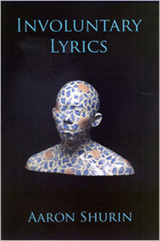
Involuntary Lyrics
Aaron Shurin
Omnidawn, 2005
With Involuntary Lyrics, we see Aaron Shurin again at the vanguard of lyric eloquence and ethical rigor as he audaciously uses one of the seminal sonnet sequences in the history of English love poetry to extend the limits of current innovative practice. Shurin's position—the sharply etched immediacy of his experience—is unabashedly that of a sexually active gay man in contemporary America, yet—and, in fact, because of—the exactitude of his insights into this subject matter, the risks and revelations of his vision extend our own sense of what it means to be human. His deft reflections show us how much the involuntary expression of language is suffused with cultural intent, how much the rhythms of the past permeate the present—and how many lost friends, lovers, opportunities, can be heard in the music of the current moment, if we listen with the kind of lyric attention that Shurin brings to language. Formally, the poems in Involuntary Lyrics press every aspect of poem's surface tensions into the service of a music that extends our appreciation of the ways a poem can mean. Shurin shifts between the taut and the tangential in his elastic use of the line, but always deploying to full advantage the line's end as fulcrum to catch the shifting center within every poetic proposition. Because Shurin uses the end words from Shakespeare's sonnets, the cadence of these poems is charged with an elegiac longing, a classical resonance that only heightens the power of Shurin's socially conscious, subversively sensual subject matter. At each line's turn, Shurin balances the trace memory of poetic history against the charged physicality of contemporary event.
[more]
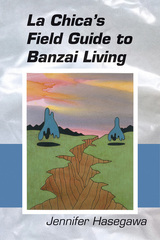
La Chica's Field Guide to Banzai Living
Jennifer Hasegawa
Omnidawn, 2019
From the small towns strung along the coast of the Big Island of Hawai‘i to the land-locked landscapes of Paraguay to the volcanic surface of Venus, this collection of poetry is a field guide to flora, fauna, and mineralia encountered, real, and imagined. Jennifer Hasegawa scans across physical and mental planes to reveal their inhabitants. Packed tightly into exploratory rocket segments, these poems ignite our gravest flaws to send our grandest potentials into orbit.
Hasegawa’s poems not only rearrange our ways of seeing the world, but they also reset the language we use in it. Banzai, with a literal translation of “10,000 years,” was used by the Japanese as a rallying cry in imperialistic and militaristic contexts. Today, the understanding of this word has shifted to a comparatively neutral translation of the enthusiastic expression “Hurrah!” in both in Japan and beyond. In La Chica’s Field Guide to Banzai Living, Hasegawa aims to reclaim banzai, recasting the language of war and unwavering loyalty and forming it into one that stands against aggression and racism and embraces tolerance and self-acceptance. Here banzai becomes a rallying cry not of war but of grand potential. La Chica’s Field Guide to Banzai Living chronicles a celebratory life and poetry filled with wonder.
Hasegawa’s poems not only rearrange our ways of seeing the world, but they also reset the language we use in it. Banzai, with a literal translation of “10,000 years,” was used by the Japanese as a rallying cry in imperialistic and militaristic contexts. Today, the understanding of this word has shifted to a comparatively neutral translation of the enthusiastic expression “Hurrah!” in both in Japan and beyond. In La Chica’s Field Guide to Banzai Living, Hasegawa aims to reclaim banzai, recasting the language of war and unwavering loyalty and forming it into one that stands against aggression and racism and embraces tolerance and self-acceptance. Here banzai becomes a rallying cry not of war but of grand potential. La Chica’s Field Guide to Banzai Living chronicles a celebratory life and poetry filled with wonder.
[more]
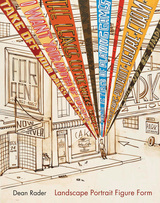
Landscape Portrait Figure Form
Dean Rader
Omnidawn, 2014
A frog and a toad walk into a book of poems. They meet Paul Klee, Hieronymus Bosch, Adrienne Rich, Sesshu Toyo, Mark Twain, all of them escorted by Dean Rader. There are adventure poems, landscapes, assassins, self portraits, there are what some might call “ideas” mixed with some very funny moments, and what we might quite seriously call “emotions.” This collection will engage those interested in innovative, arresting, humorously engaging poetry.
[more]

Letters from the Black Ark
D.S. Marriott
Omnidawn, 2023
Rhythmic lyrical poems that embody black music, existence, and tragedy.
The poems in this collection center on the word “dub,” which accrues a subtle lyrical connotation throughout its various forms and meanings—to bestow, vest, crown, and also to suspend, reverb, echo, and sever. Dub poetry plays with revealing and concealing, while also pointing the way to the conditions that produce black poetic music. In D.S. Marriott’s poetry, tragic catastrophes of current black existence—London knife crime, the Windrush scandal, Grenfell, and deadly race violence—are portrayed as questions of language. To speak this language, as Marriott’s poem show, is to take on the forces that cause rupture. Throughout these poems of loss, exile, and obliteration, the poet foresees his downfall and metamorphosis, ultimately realizing too late that he cannot transcend the reverberations and echoes laden with black social death.
The poems in this collection center on the word “dub,” which accrues a subtle lyrical connotation throughout its various forms and meanings—to bestow, vest, crown, and also to suspend, reverb, echo, and sever. Dub poetry plays with revealing and concealing, while also pointing the way to the conditions that produce black poetic music. In D.S. Marriott’s poetry, tragic catastrophes of current black existence—London knife crime, the Windrush scandal, Grenfell, and deadly race violence—are portrayed as questions of language. To speak this language, as Marriott’s poem show, is to take on the forces that cause rupture. Throughout these poems of loss, exile, and obliteration, the poet foresees his downfall and metamorphosis, ultimately realizing too late that he cannot transcend the reverberations and echoes laden with black social death.
[more]
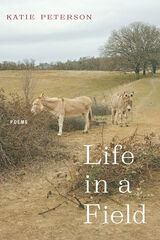
Life in a Field
Poems
Katie Peterson
Omnidawn, 2021
This is a comedy about climate change, in which a girl and a donkey become friends, then decide to marry time.
A lyric fable, Life in a Field intersperses Katie Peterson’s slow-moving, cinematic, and sensual writing with three folios of photographs by Young Suh. Introspection, wish, dream, and memory mark this tale, which is set in a location resembling twenty-first-century California—with vistas and orchards threatened by drought and fires. This is also a place of enchantment, a fairy-tale landscape where humans and animals live as equals. As the girl and the donkey grow up, they respond to the difficulties of contemporary civilization, asking a question that meets our existential moment: What do you do with the story you didn’t wish for? A narrator’s voice combines candor with distance, attempting to find a path through our familiar strife, toward a future that feels all but impossible, and into what remains of beauty and pleasure. Life in a Field tries to reverse our accelerating destruction of the natural world, reminding us of “the cold clarity we need to continue on this earth.”
A lyric fable, Life in a Field intersperses Katie Peterson’s slow-moving, cinematic, and sensual writing with three folios of photographs by Young Suh. Introspection, wish, dream, and memory mark this tale, which is set in a location resembling twenty-first-century California—with vistas and orchards threatened by drought and fires. This is also a place of enchantment, a fairy-tale landscape where humans and animals live as equals. As the girl and the donkey grow up, they respond to the difficulties of contemporary civilization, asking a question that meets our existential moment: What do you do with the story you didn’t wish for? A narrator’s voice combines candor with distance, attempting to find a path through our familiar strife, toward a future that feels all but impossible, and into what remains of beauty and pleasure. Life in a Field tries to reverse our accelerating destruction of the natural world, reminding us of “the cold clarity we need to continue on this earth.”
[more]
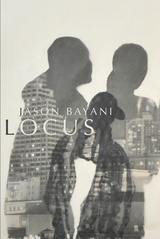
Locus
Jason Bayani
Omnidawn, 2019
Life in a multicultural, multiethnic nation like the United States leads to complicated, sometimes fragmented experiences of our background and identity. In Locus, Jason Bayani’s poetry explores the experience of identity that haunts Pilipinx-Americans in the wake of the 1965 Hart-Celler Immigration Act, a critical moment left out of most histories of Asian-American life in the United States. Bayani’s poetry seeks to recuperate this silenced experience, rendering the loss of memory migration entails and representing the fragments of cultural history that surface in a new national context. Drawing inspiration from the mixing and layering of musical fragments in DJ culture, Locus lays down tracks of memory to create a confident declaration of a distinctly Pilipinx-American voice, history, and artistic power. Indeed, his work reveals how these new creations often tie us to the most fundamental parts of ourselves: our families, our cultures, the vague memories passed down through generations.
In Locus, Bayani both renders the challenges of migration and captures an experience of selfhood and history, asserting a central place for migrant identity and experience in American culture.
[more]
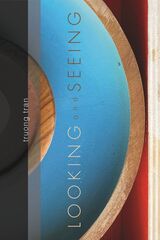
Looking and Seeing/Seeing and Looking
Damon Potter and Truong Tran
Omnidawn, 2023
Two books bound together that interrogate race—one from the perspective of a man of color, and the other from the perspective of a white man.
This book brings together different perspectives under two titles, considering the lives and experiences of two friends, one Vietnamese American and one white. Looking And Seeing is a poetic work of yearning, regret, and righteous indignation. In Truong Tran’s poetry, what is said and what is written reveal our complexities. Composed as an investigation of his own being and body as a brown person moving through white spaces, this collection moves alongside Tran’s friend and collaborator Damon Potter. Seeing and Looking offers a record of Potter’s perspective as a white man examining who he is and wants to be and the complications of trying to be good while also benefiting from histories of oppression. Potter considers death—both his own future death and the deaths of his friends—while grappling with how to witness horrors, wonders, and his self.
This book brings together different perspectives under two titles, considering the lives and experiences of two friends, one Vietnamese American and one white. Looking And Seeing is a poetic work of yearning, regret, and righteous indignation. In Truong Tran’s poetry, what is said and what is written reveal our complexities. Composed as an investigation of his own being and body as a brown person moving through white spaces, this collection moves alongside Tran’s friend and collaborator Damon Potter. Seeing and Looking offers a record of Potter’s perspective as a white man examining who he is and wants to be and the complications of trying to be good while also benefiting from histories of oppression. Potter considers death—both his own future death and the deaths of his friends—while grappling with how to witness horrors, wonders, and his self.
[more]
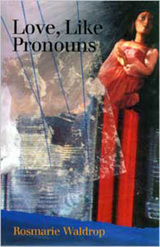
Love, Like Pronouns
Rosmarie Waldrop
Omnidawn, 2003
With the title of her latest collection, Love, Like Pronouns, Waldrop demonstrates with deft humor the relational aspects of any discourse. And, she implicitly suggests the similar slipperiness in human emotion and in human speech, as both the love object and the pronoun's referent easily shift with, even because of any attempt to articulate it. The title also subtly resonates with Waldrop's admiration for other writers, as well as demonstrates her awareness that each act of writing occurs in relation to—and within—the environment of other writings, past and present. In this collection, poem cycles dedicated to other writers echo with subtle synchronisms of that writer's forms, tones, textures. Yet from out of this synchronism, Waldrop evolves her own unique mediums of address. Each poem travels its own distinct and unrepeatable conduit between experience and language. Waldrop is an accomplished and applauded writer of poetry, fiction, essays and translation.
[more]
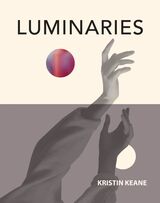
Luminaries
Kristin Keane
Omnidawn, 2021
Agnes has been drifting away from herself. People look through her, her husband doesn’t understand her, and lately, she’s begun losing the sensations in her body. When a tube of shoplifted lipstick awakens her back to life, an impulse for stealing emerges that leads her to a court-ordered service at a camp for grieving children. While initially hoping only that the time there will help her give up stealing, Agnes soon learns that she can use objects to connect grieving children with the spirits of their parents. She must navigate the choice between using her compulsion for her own pleasure and helping the bereaved. Luminaries is about the things we take and about the things that are taken from us. It asks what it means to exist in lives filled with loss, to reach for the things we hope will restore us, and the risks we’re willing to take to ward off yearning—both in our material lives and social lives.
Luminaries is the winner of the Omnidawn Fabulist Fiction Novelette/Chapbook Prize, selected by Kellie Wells.
Luminaries is the winner of the Omnidawn Fabulist Fiction Novelette/Chapbook Prize, selected by Kellie Wells.
[more]

music from behind a stone wall
Steven Rood
Omnidawn, 2024
A collection expressing musical experience and daily life through poetry.
The poems in Steven Rood’s newest collection take on a musical sensibility as they flow from the poet’s sixty years as a classical guitarist who remains preoccupied with the tonalities of daily life. Each poem in music from behind a stone wall comes together to build a multi-layered symphony that reveals the delights and travails of family life and moments of intimate connection with animals and plants. At the core of the book are poems considering the overwhelming task of trying to communicate the essence of musical experience via the written word. This is a book of grief and joy sung with lyric acuity, vivid images, and formal variation.
The poems in Steven Rood’s newest collection take on a musical sensibility as they flow from the poet’s sixty years as a classical guitarist who remains preoccupied with the tonalities of daily life. Each poem in music from behind a stone wall comes together to build a multi-layered symphony that reveals the delights and travails of family life and moments of intimate connection with animals and plants. At the core of the book are poems considering the overwhelming task of trying to communicate the essence of musical experience via the written word. This is a book of grief and joy sung with lyric acuity, vivid images, and formal variation.
[more]

Naming the Wind
Steven Rood
Omnidawn, 2022
Poems that navigate the complexities of human relationships, personal ethics, and religious tradition.
Wind moves through this collection, opening the poems to the dying beauty of the natural world, to the weathers inside the psyche and without, and to the connections between a family and between the speaker his mentor, the great poet Jack Gilbert. The collection navigates the intimacies of human relationships with others, the challenges of working as a lawyer trying to maintain integrity as others fall prey to corporate greed, and the complexity of holding a Jewish identity while being awake to tradition’s hold on the mind and its cost. Steven Rood offers a powerful account of how to be a human in dynamic relationships while also holding respect for the non-human beings that comprise most of the life on our planet.
Rood employs structures and forms that directly relate to the content of the poems themselves. Spontaneous breaks and starts reflect the writer’s turns of mind, offering readers insight into the meaning and measure of the work.
Wind moves through this collection, opening the poems to the dying beauty of the natural world, to the weathers inside the psyche and without, and to the connections between a family and between the speaker his mentor, the great poet Jack Gilbert. The collection navigates the intimacies of human relationships with others, the challenges of working as a lawyer trying to maintain integrity as others fall prey to corporate greed, and the complexity of holding a Jewish identity while being awake to tradition’s hold on the mind and its cost. Steven Rood offers a powerful account of how to be a human in dynamic relationships while also holding respect for the non-human beings that comprise most of the life on our planet.
Rood employs structures and forms that directly relate to the content of the poems themselves. Spontaneous breaks and starts reflect the writer’s turns of mind, offering readers insight into the meaning and measure of the work.
[more]

(no subject)
Peter Burghardt
Omnidawn, 2022
Poems derived from momentary reflections saved in the poet’s subjectless emails.
The poems of (no subject) are an investigation of the personal and the everyday. This collection draws inspiration from the idea of the quickly written subjectless email, as the poet would clear small periods of time to write and record observations and thoughts, then send it to himself in untitled emails. The book takes the shape of an impressionistic twenty-first-century diary, reflecting on themes of anxiety about the future and the situation of the present. As these moments compound, the line between the present, past, and future is blurred in the conflation of self and memory. Driven by a speaker who is hermetically sealed in their private world, these ostensibly subjectless poems derive their meaning through the tension between narrative and emotional resonances. Through moment-to-moment reflections, (no subject) digs deep in search of the big little feelings transmitted by fatherhood, the fusion of time and space, loneliness, resilience, and wonder.
The poems of (no subject) are an investigation of the personal and the everyday. This collection draws inspiration from the idea of the quickly written subjectless email, as the poet would clear small periods of time to write and record observations and thoughts, then send it to himself in untitled emails. The book takes the shape of an impressionistic twenty-first-century diary, reflecting on themes of anxiety about the future and the situation of the present. As these moments compound, the line between the present, past, and future is blurred in the conflation of self and memory. Driven by a speaker who is hermetically sealed in their private world, these ostensibly subjectless poems derive their meaning through the tension between narrative and emotional resonances. Through moment-to-moment reflections, (no subject) digs deep in search of the big little feelings transmitted by fatherhood, the fusion of time and space, loneliness, resilience, and wonder.
[more]
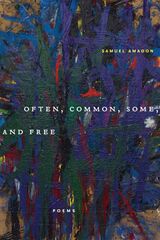
Often, Common, Some, and Free
Samuel Amadon
Omnidawn, 2021
Poems considering ever-present transformations and resisting destruction.
This is a book about transformation. Moving across varied formal and aesthetic terrains, these poems take on the subject of change, considering the construction and demolition of buildings, roaming between cities, and drawing together an image of a world in flux. The speaker is in movement—walking, flying, swimming, and taking the train, while also constantly twisting in his sentences, turning into different versions of himself, and braiding his voice with others. These poems take on subjects that encompass creation and loss from Robert Moses’s career transforming the cityscape of New York to the robbery of works from Boston’s Gardner Museum. But, ultimately, these poems aim to resist destruction, to focus on the particular, and to hold still their world and their ever-shifting speaker.
This is a book about transformation. Moving across varied formal and aesthetic terrains, these poems take on the subject of change, considering the construction and demolition of buildings, roaming between cities, and drawing together an image of a world in flux. The speaker is in movement—walking, flying, swimming, and taking the train, while also constantly twisting in his sentences, turning into different versions of himself, and braiding his voice with others. These poems take on subjects that encompass creation and loss from Robert Moses’s career transforming the cityscape of New York to the robbery of works from Boston’s Gardner Museum. But, ultimately, these poems aim to resist destruction, to focus on the particular, and to hold still their world and their ever-shifting speaker.
[more]
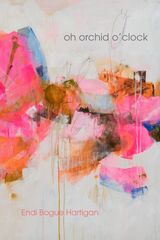
oh orchid o’clock
Endi Bogue Hartigan
Omnidawn, 2023
Poems that break down, expose, and reconsider our notions of time.
This collection speaks the language of the clock as a living instrument, exposing the sensory impacts of our obsession with time. In oh orchid o’clock, lyrics wind through histories like a nervous system through a body. The poems speak to how we let our days become over-clocked, over-transactional, and over-weaponed. With an instrumental sensibility, Endi Bogue Hartigan investigates what it is to be close to time—collective time, with its alarms and brutalities, and bodily time, intricate and familial. She considers how can we be both captured and complicit within systems of measurement, and she invites us to imagine how to break from, create, or become immune to them. Her poems use language to expose the face of the clock to reveal how gears press against interconnecting systems—economic, capitalist, astronomical, medical, governmental, and fantastical.
This collection speaks the language of the clock as a living instrument, exposing the sensory impacts of our obsession with time. In oh orchid o’clock, lyrics wind through histories like a nervous system through a body. The poems speak to how we let our days become over-clocked, over-transactional, and over-weaponed. With an instrumental sensibility, Endi Bogue Hartigan investigates what it is to be close to time—collective time, with its alarms and brutalities, and bodily time, intricate and familial. She considers how can we be both captured and complicit within systems of measurement, and she invites us to imagine how to break from, create, or become immune to them. Her poems use language to expose the face of the clock to reveal how gears press against interconnecting systems—economic, capitalist, astronomical, medical, governmental, and fantastical.
[more]
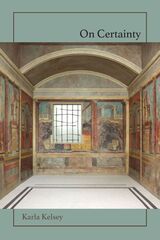
On Certainty
Karla Kelsey
Omnidawn, 2023
Lyrical poems that tell the story of a nameless woman navigating a technological dystopia.
In the poems of On Certainty, an unnamed woman in a strangely familiar dystopia narrates a story of power and decline, where the Tyrant has gained ascendency and the Philosopher is dying. Here, the Tyrant rules over a decimated ecology filled with android deer, burnt towns, and exhausted individuals dependent on virtual reality augmentation. In choosing whether to take the Philosopher’s place in a struggle against the Tyrant, the narrator must consider how her decision may perpetuate the currently existing catastrophic systems.
Weaving together speculative fiction, philosophical aphorism, lyric fragment, and documentary technique, On Certainty echoes the contemporary world that can feel simultaneously quotidian and strange.
In the poems of On Certainty, an unnamed woman in a strangely familiar dystopia narrates a story of power and decline, where the Tyrant has gained ascendency and the Philosopher is dying. Here, the Tyrant rules over a decimated ecology filled with android deer, burnt towns, and exhausted individuals dependent on virtual reality augmentation. In choosing whether to take the Philosopher’s place in a struggle against the Tyrant, the narrator must consider how her decision may perpetuate the currently existing catastrophic systems.
Weaving together speculative fiction, philosophical aphorism, lyric fragment, and documentary technique, On Certainty echoes the contemporary world that can feel simultaneously quotidian and strange.
[more]
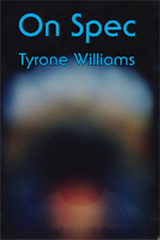
On Spec
Tyrone Williams
Omnidawn, 2007
Tyrone Williams reveals that every act of communication is a speculation, and that the spectacles we must use to see and assess it—those of our own particular condition and conditioning—are never without qualifying contour and coloration. Williams is a keen observer of the distortions of such lenses, as the titles of the two sections of this collection suggest—first is an “Eshuneutics” (interpretation purportedly infused with an Eshu’s sensibility). But the trickster’s eye can turn to mock even its own powers of analysis, as Williams deftly demonstrates by calling the second section “Pseudo-eshuneutics.” While the issues that Williams confronts come directly from an attempt say what it might mean to understand aspects of the African American condition of diaspora in the United States, these poems also implicate and illuminate the speculative enterprise that we each venture into whenever we attempt to articulate what we see and what we believe about it. At once immediately readable, intensely meditative, and brilliantly braced with philosophical reference, these tours through our human need to speak, and to understand, travel beyond the boundaries that constrain most poetry collections. Poems, plays, plays upon the making of such genre distinctions, are only some of the locations one will visit in these pages.
[more]
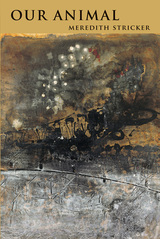
Our Animal
Meredith Stricker
Omnidawn, 2016
Our Animal hybridizes novel flaking into poetic forms like a gnat swarm, magnetic filings, or migratory flux. It’s a fierce inquiry into Othering, tracking Kafka’s life through his deep identification with animals, especially those hunted or outcast. Graphically complex with metamorphic text layers, the chapters shape-shift in relation to crows, dragonflies, a frog; there are deer, swallows, a goldfinch, humans, a hybrid Beast, wolf, Insekt, a small unidentified animal in its burrow. We are entangled in biography as biology— paradisiacal transfiguration that leaves out no being.
[more]
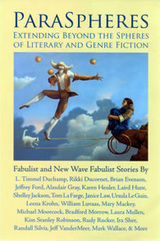
ParaSpheres
Edited by Ken E. Keegan and Rusty Morrison
Omnidawn, 2006
With Fabulist and New Wave Fabulist stories by 44 Literary and Genre authors, this anthology follows in the footsteps of Conjunctions 39 (from Bard College, New York), the Fall 2002 issue, which focused on New Wave Fabulist writers.
[more]
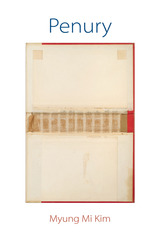
Penury
Myung Mi Kim
Omnidawn, 2009
In Penury, Myung Mi Kim probes sanctioned norms of cognition by breaking communication into its most discrete components. With these irruptions and suspensions, she writes into extremes of forced loss, violence, and impoverishment. Exposing latent relations in sound and sense, Kim proposes how new ethical awareness can be encountered where the word and its meaning/s are formed. Here, language is not offered as transparent communication of ideas, but as testament to and disruption of oppressive dominant concepts and cultural practices. "Penury" means poverty, but in this text's radical relation to lack, we hear the most elemental and active forms of change.
[more]

Pink Waves
Sawako Nakayasu
Omnidawn, 2021
A poem in conversation with literature and written during a durational performance.
Written in loose sonata form, Pink Waves is a poem of radiant elegy and quiet protest. Moving through the shifting surfaces of inarticulable loss, and along the edges of darkness and sadness, Pink Waves was completed in the presence of audience members over the course of a three-day durational performance. Sawako Nakayasu accrues lines written in conversation with Waveform by Amber DiPietro and Denise Leto, and micro-translations of syntax in the Black Dada Reader by Adam Pendleton, itself drawn from Ron Silliman’s Ketjak. Pink Waves holds an amalgamation of texts, constructing a shimmering haunting of tenderness, hunger, and detritus.
Written in loose sonata form, Pink Waves is a poem of radiant elegy and quiet protest. Moving through the shifting surfaces of inarticulable loss, and along the edges of darkness and sadness, Pink Waves was completed in the presence of audience members over the course of a three-day durational performance. Sawako Nakayasu accrues lines written in conversation with Waveform by Amber DiPietro and Denise Leto, and micro-translations of syntax in the Black Dada Reader by Adam Pendleton, itself drawn from Ron Silliman’s Ketjak. Pink Waves holds an amalgamation of texts, constructing a shimmering haunting of tenderness, hunger, and detritus.
[more]

The Place One Is
Martha Ronk
Omnidawn, 2022
A collection from celebrated poet Martha Ronk considering the relationship between person, body, and place.
The Place One Is explores the intersection of person and place, the ways in which changes in the tangible world alter one’s vision, bodily posture, vocabulary, and concern for—to take one example—the dwindling water supply in California. The body’s position, its geometry, and the topography of the surrounding land become less and less recognizable as body and world blend together. Gravel giving way underfoot mirrors the way that words dissolve into mumbles, and the skeleton of a rusty car on the sand appears like one’s own skeleton. Ronk shows that disintegration here is disintegration there. These poems also wonder at interdependence, considering how lines intersect and continue to connect us to the sea—and to islands, lagoons, greenery, sky, and space.
In the first part of the collection, the poems focus on a rural landscape, and in the second part, they consider the overly bright urban world of Los Angeles.
The Place One Is explores the intersection of person and place, the ways in which changes in the tangible world alter one’s vision, bodily posture, vocabulary, and concern for—to take one example—the dwindling water supply in California. The body’s position, its geometry, and the topography of the surrounding land become less and less recognizable as body and world blend together. Gravel giving way underfoot mirrors the way that words dissolve into mumbles, and the skeleton of a rusty car on the sand appears like one’s own skeleton. Ronk shows that disintegration here is disintegration there. These poems also wonder at interdependence, considering how lines intersect and continue to connect us to the sea—and to islands, lagoons, greenery, sky, and space.
In the first part of the collection, the poems focus on a rural landscape, and in the second part, they consider the overly bright urban world of Los Angeles.
[more]
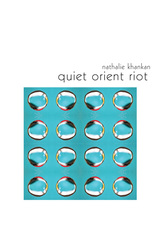
Quiet Orient Riot
Nathalie Khankan
Omnidawn, 2020
Quiet Orient Riot is an exploration of the tendons of motherhood, its mutinies and munificences. It is also a book of births and the politics of birth-regimes. Recounting a journey to bear a Palestinian child in the occupied Palestinian territory, the poems conjure up maternity as forecast, tally, weapon; its many filtrations through liturgical command and demographic anxiety. Maternity is made possible through contingent access to Israel’s sophisticated fertility treatment infrastructure, and it’s made impossible as it coincides with Israel’s 2009 assault on the Gaza Strip. What kind of language, then, can hold a body inside a body through emergency, diminishment, and into resistance and bloom? What kind of language might hold precarious humanhood?
Most significantly, Quiet Orient Riot asks of itself, without release or relief: can a text seek linguistic disorientation and reorientation both? Can a text walk the tightrope from detail to detail to envision a kind of awareness that is kin to worship? Quiet Orient Riot does not shy away from a word like “worship.” Nor does it shy away from how such worship might manifest in the words of a poem, bowing to a “chirpy printed sound” in Palestine and a forest of “little justices.”
She is the winner of the 2019 Omnidawn 1st/2nd Poetry Book Contest, chosen by Dawn Lundy Martin.
Most significantly, Quiet Orient Riot asks of itself, without release or relief: can a text seek linguistic disorientation and reorientation both? Can a text walk the tightrope from detail to detail to envision a kind of awareness that is kin to worship? Quiet Orient Riot does not shy away from a word like “worship.” Nor does it shy away from how such worship might manifest in the words of a poem, bowing to a “chirpy printed sound” in Palestine and a forest of “little justices.”
She is the winner of the 2019 Omnidawn 1st/2nd Poetry Book Contest, chosen by Dawn Lundy Martin.
[more]
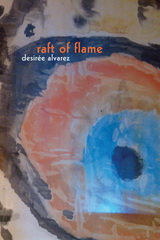
Raft of Flame
Desirée Alvarez
Omnidawn, 2019
A painter and poet, Desirée Alvarez engages with the powerful forces of lyric and rhythm to create a collection that moves across time and place. Inspired by Lorca’s passionate cante jondo, or “deep song,” and her own family history with Andalusian flamenco, Alvarez weaves together a time-travelling epic that searches through myth, culture, and nature for the roots of identity. Navigating both her Latina and European heritage through works by artists of the ancient Americas and Spain, Alvarez maps intersections between personal and political history. Searching narratives both fictitious and real, Raft of Flame includes imagined conversations between a conquistador and an Olmec sculpture, between Frida Kahlo and Velazquez, and between The Wizard of Oz’s Dorothy and Glinda the Good Witch.
In Raft of Flame, Alvarez constructs and fleshes out a fantastic narrative of personal and cultural history, offering glimpses into the art, history, and land that comprise her story. Her narrative explores how both nature and human populations continue to be trapped in the violence of colonialism. Vivid lyrics interrogate the complexities of mixed race, digging the dualities, upheavals, and casts of characters that underly Alvarez’s identity.
Raft of Flame won Omnidawn's 2018 Lake Merritt Prize.
In Raft of Flame, Alvarez constructs and fleshes out a fantastic narrative of personal and cultural history, offering glimpses into the art, history, and land that comprise her story. Her narrative explores how both nature and human populations continue to be trapped in the violence of colonialism. Vivid lyrics interrogate the complexities of mixed race, digging the dualities, upheavals, and casts of characters that underly Alvarez’s identity.
Raft of Flame won Omnidawn's 2018 Lake Merritt Prize.
[more]

RAG
Julie Carr
Omnidawn, 2014
The question of civic lyric—the possibility of a politics of mourning—runs through this book-length aria-errancy-eros. All vectors of “rag” are at work: polemic political journal, syncopated turn-of-century song, menstrual blood, burial shroud, complaint, insult, a wiping cloth, the barest semblance of clothes, the slang word for woman. The energy running beneath this rag is human violence and sexual force erupting through fragments of film, fairy tale, news, novels: a father on fire, stranger in tears, prisoner who believes he’s a dog, women dressed in food, women refusing to eat, a body with no face, or a face with no skin. RAG spirals forward, picking up recurrent language, its narratives troubled by stutter, broken by what can’t be told.
[more]

Real Life
An Installation
Julie Carr
Omnidawn, 2018
In a book rich with formal variety and lyric intensity, Carr takes up economic inequality, gendered violence, losses both personal and national, and the crisis of the body within all of these forces. Real Life: An Installation is a terrifying book, but one that keeps us close as it moves through the disruptions and eruptions of the real.
[more]

The Rendering
Anthony Cody
Omnidawn, 2023
A poetry collection that considers climate change and the possibility of wholeness within the Anthropocene.
Through a series of experimental poems centered on ecology, Anthony Cody’s The Rendering confronts the history of the Dust Bowl and its residual impacts on our current climate crisis, while acknowledging the complicities of capitalism. These poems grapple with questions of wholeness and annihilation in an Anthropocenic world where the fallout of settler colonialism continues to inflict environmental and cultural devastation. Cody encourages readers to participate in radical acts of refreshing and reimagining the page, poem, collection, and the self, and he invites us to reflect on what lies ahead should our climate continue on its current trajectory toward destruction.
These poems consider if wholeness, or a journey toward wholeness, can exist in the Anthropocene. And, if wholeness cannot exist in these times, we are invited to look at our lives and the world through and beyond annihilation.
Through a series of experimental poems centered on ecology, Anthony Cody’s The Rendering confronts the history of the Dust Bowl and its residual impacts on our current climate crisis, while acknowledging the complicities of capitalism. These poems grapple with questions of wholeness and annihilation in an Anthropocenic world where the fallout of settler colonialism continues to inflict environmental and cultural devastation. Cody encourages readers to participate in radical acts of refreshing and reimagining the page, poem, collection, and the self, and he invites us to reflect on what lies ahead should our climate continue on its current trajectory toward destruction.
These poems consider if wholeness, or a journey toward wholeness, can exist in the Anthropocene. And, if wholeness cannot exist in these times, we are invited to look at our lives and the world through and beyond annihilation.
[more]
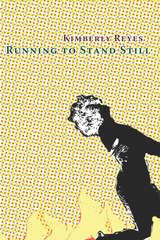
Running to Stand Still
Kimberly Reyes
Omnidawn, 2019
Histories, stories, lyrics, aspirations, dreams, pressures, and images are spun into a musical tale through a site of convergence: the Black female body. Swarmed by external gazes and narratives, the inhabitant of this body uses her power to turn down this cacophony of noise and compose a symphonic space for herself. By breaching boundaries of racism, sexism, sizeism, colorism, and colonialism, these poems investigate the memories and realities of existing as Black in America. Building from poetic, journalistic, and musical histories, poet and essayist Kimberly Reyes constructs a complex and fantastic narrative in which she negotiates a path to claim her own power.
These poems teem with life, a life rich with many selves and many histories that populate in the voice of Reyes’s poetic narrator. They sway between negotiations of hypervisibility and erasure, the inevitable and the chosen, and the perceived and the constructed. Reyes’s poems offer sharp observations and lyrical movement to guide us in a ballad of reconciliation and becoming.
These poems teem with life, a life rich with many selves and many histories that populate in the voice of Reyes’s poetic narrator. They sway between negotiations of hypervisibility and erasure, the inevitable and the chosen, and the perceived and the constructed. Reyes’s poems offer sharp observations and lyrical movement to guide us in a ballad of reconciliation and becoming.
[more]

Saint Petersburg Notebook
Ann Lauterbach
Omnidawn, 2014
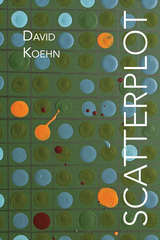
Scatterplot
David Koehn
Omnidawn, 2019
Scatterplot navigates a vast landscape of imagination through variations on being lost and found. David Koehn’s investigative journeys allow space for the failures of consciousness and gaps in the knowable as he traverses a sensory terrain through the shadow of natural history and the glow of the family room TV. In this wilderness is a father and son walking the sloughs of the California delta, searching through the mayhem of a world dismissive of, but also requiring, love.
Koehn diagrams connections from media, art, film, music, nature, history, and his own family into a web of coordinates that form constellations of beauty and tragedy. He moves from the music of the Bad Brains, to the grotesque lifecycle of the Tongue-Eating Louse, to the deconstruction of Mutant Mania toys, and on through the poems of David Antin and the suicide of Anthony Bourdain, building a fantastical world from the wild realities of the real one. In a universe so full of imperfection one can’t help but both laugh and cry, the poet embraces the present while taking responsibility for his own insufficiencies. Amounting to a mix of experiments—erasures, surreal narratives, collage, walking poems, and more—the delta between right now and forever feels both inescapably present and delightfully confused. Immense vulnerability, infinitely odd observations, and uninhibited daring populate the psychological terrain in the poems of Scatterplot as Koehn invites us to join his spiraling poetic exploration.
Koehn diagrams connections from media, art, film, music, nature, history, and his own family into a web of coordinates that form constellations of beauty and tragedy. He moves from the music of the Bad Brains, to the grotesque lifecycle of the Tongue-Eating Louse, to the deconstruction of Mutant Mania toys, and on through the poems of David Antin and the suicide of Anthony Bourdain, building a fantastical world from the wild realities of the real one. In a universe so full of imperfection one can’t help but both laugh and cry, the poet embraces the present while taking responsibility for his own insufficiencies. Amounting to a mix of experiments—erasures, surreal narratives, collage, walking poems, and more—the delta between right now and forever feels both inescapably present and delightfully confused. Immense vulnerability, infinitely odd observations, and uninhibited daring populate the psychological terrain in the poems of Scatterplot as Koehn invites us to join his spiraling poetic exploration.
[more]
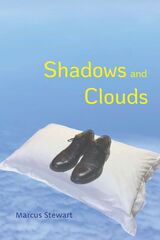
Shadows and Clouds
Marcus Stewart
Omnidawn, 2023
Stories that question our experience of time, truth, and memory.
Through the stories in Shadows and Clouds, Marcus Stewart invites us to consider how things are not always as they appear or as we remember them, instead locating reality in the imagination and the dream world. While animals understand the world without words, humans create our experiences as stories, translating past and future into tales told in the present. Stewart's stories take the notion of storytelling and expand to a consideration of how truth, misremembering, logic, lying, and uncertainty play together to affect our experience of reality. In an alternate reading of time, Stewart poses the suggestion that you may already have a future memory of reading this book, and reading the stories backward may bring us back to the present.
Shadows and Clouds is the winner of the 2021 Omnidawn Fabulist Fiction Chapbook / Novelette Contest, chosen by Theodora Ziolkowski.
Through the stories in Shadows and Clouds, Marcus Stewart invites us to consider how things are not always as they appear or as we remember them, instead locating reality in the imagination and the dream world. While animals understand the world without words, humans create our experiences as stories, translating past and future into tales told in the present. Stewart's stories take the notion of storytelling and expand to a consideration of how truth, misremembering, logic, lying, and uncertainty play together to affect our experience of reality. In an alternate reading of time, Stewart poses the suggestion that you may already have a future memory of reading this book, and reading the stories backward may bring us back to the present.
Shadows and Clouds is the winner of the 2021 Omnidawn Fabulist Fiction Chapbook / Novelette Contest, chosen by Theodora Ziolkowski.
[more]
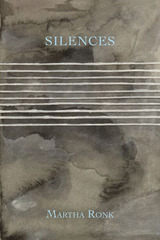
Silences
Martha Ronk
Omnidawn, 2019
Within the visual arts of painting and photography, Martha Ronk finds an undeniable presence lurking: silence. This character slips into pauses, hides between images, and expertly evades the grasp of language. Ronk shows us that what is hidden just off screen in these images might just be the force that gives them power. The poems in Silences seek possibilities of how to form language from a phenomenon that so earnestly resists it. Rather than coax silence out of hiding, Ronk’s poems respond to its mysterious presence through questions and conjecture.
These poems endeavor to give a much-deserved voice to silence, addressing the power of what is not seen. While silence remains perpetually out of reach, Ronk invites us to follow the language that creeps up to its edges. The poems in this collection form an inquiry that moves through the presence of silence and reveals insights into the character of the visual art in which it lives.
These poems endeavor to give a much-deserved voice to silence, addressing the power of what is not seen. While silence remains perpetually out of reach, Ronk invites us to follow the language that creeps up to its edges. The poems in this collection form an inquiry that moves through the presence of silence and reveals insights into the character of the visual art in which it lives.
[more]

Since Sunday
Brittany Tomaselli
Omnidawn, 2019
What happens when the faith and community we once held close sours into an experience of tragedy? In Since Sunday, we find a poet who is rebuilding a sense of faith after fleeing religious abuse. Doubt, shame, uncertainty, and the pains of loss create the ground from which these poems grow. After severance from her religion, established values, and sense of direction, Tomaselli embarks on recovery as an active and intentional pursuit. The poems reveal a resilience that must be lived as a daily effort to cope with trauma and to root oneself in the present.
Through wit, vulnerability, and rich lyrical language, Tomaselli invites us to walk with her through loss and on to a persistent process of discovery. The poems chronicle a cultivation of awe, unearthing a fresh faith rooted in the present realness of everyday experiences. Stripped of the orthodoxy that both grew and crushed her, she reconstructs a new core of trust for herself. Here we learn with the poet to seek celebration in daily life and to foster a sense of beauty from the mundane.
Through wit, vulnerability, and rich lyrical language, Tomaselli invites us to walk with her through loss and on to a persistent process of discovery. The poems chronicle a cultivation of awe, unearthing a fresh faith rooted in the present realness of everyday experiences. Stripped of the orthodoxy that both grew and crushed her, she reconstructs a new core of trust for herself. Here we learn with the poet to seek celebration in daily life and to foster a sense of beauty from the mundane.
[more]
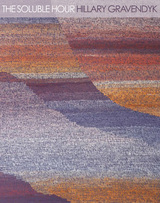
The Soluble Hour
Hillary Gravendyk
Omnidawn, 2017
In Hillary Gravendyk’s The Soluble Hour, the speaker sings with visionary passion how the beloved and dear ones will soon be without her and laments for their imminent grief. But being in extremis pulls the voice towards testimony of unquestioned love, a recollection of landscapes Californian and otherwise, and previous selves. The poet wields her deep solitude as the measure of truth and conviction, the self that accepts its own impermanence.
[more]
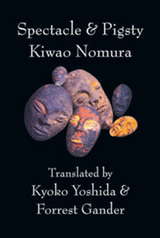
Spectacle & Pigsty
Kiwao Nomura
Omnidawn, 2011
If you think of haiku when you think of Japanese poetry, this book will be a huge surprise. The strange and wild poems of Kiwao Nomura deal with sex and loss and memory by making unpredictable leaps of association. Imagine Fugazi singing philosophy and you get close. Inspired by shamanism, Kiwao Nomura sounds like nothing you’ve ever heard before and like something you want to hear over and over. He is one of the two or three of the most influential living Japanese poets, and his work will be as stunningly original and compelling to contemporary Americans as haiku was to the late Victorians. Anyone interested in making contact with Japanese culture will want to read Spectacle & Pigsty.
[more]

Squander
Elena Karina Byrne
Omnidawn, 2016
Squander occupies a place where “the mind’s upstairs windows [are] blown out”: a place of juxtapositional delight through sensory and conceptual dislocation. Poems based in word origins work as fables, and poems based in dialogue work within a select concordance from authors and artists. The consequent subject’s meaning is diverted and new vantage points are created. Squander’s energized music, its alliance with feeling’s final rhythm “makes us complicit” in the re-awaking of language.
[more]
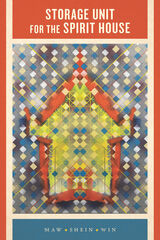
Storage Unit for the Spirit House
Maw Shein Win
Omnidawn, 2020
With sharp focus and startling language, the poems in Maw Shein Win’s second book, Storage Unit for the Spirit House, look through physical objects to glimpse the ephemeral, the material, and the immaterial. Vinyl records, felt wolverines, a belt used to punish children, pain pills, and “show dogs with bejeweled collars” crowd into Win’s real and imagined storage units. Nats, Buddhist animist deities from her family’s homeland of Burma, haunt the book’s six sections. The nats, spirits believed to have the power to influence everyday lives, inhabit the storage units and hover around objects while forgotten children sleep under Mylar blankets and daughters try to see through the haze of a father’s cigarette smoke.
Assemblages of both earthly and noncorporeal possessions throughout the collection become resonant and alive, and Win must summon “a circle of drums and copper bells” to appease the nats who have moved into a long-ago family house. This careful curation of unlikely objects and images becomes an act of ritual collection that uses language to interrogate how pain in life can transform someone into a nat or a siren that lives on. Restrained lines request our imagination as we move with the poet through haunted spaces and the objects that inhabit them.
Assemblages of both earthly and noncorporeal possessions throughout the collection become resonant and alive, and Win must summon “a circle of drums and copper bells” to appease the nats who have moved into a long-ago family house. This careful curation of unlikely objects and images becomes an act of ritual collection that uses language to interrogate how pain in life can transform someone into a nat or a siren that lives on. Restrained lines request our imagination as we move with the poet through haunted spaces and the objects that inhabit them.
[more]
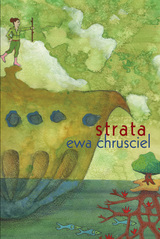
Strata
Ewa Chrusciel
Omnidawn, 2018
In Ewa Chrusciel’s first book in English, Strata, an exile’s memories are . . . at once a rapture of possession (of being possessed) and defeatingly untotalizable. Strata is . . . a tumultuous revelation of how much of the past there still is, right here in the near flight of letters, and of the burn of being in time at all, the difficulty of catching up with oneself in a universe that is never one, but always scattered. Strata is a book of concuspiscences, of combings for pleasures, yes, but even more for the Sacred Book it wants to be. In its every line, it shows that the rhapsodic is the right approach to the truth about the world. —from the foreword by Calvin Bedient Praise for Ewa Chrusciel’s poetry “With a wonderful insistence, each phrase in Ewa Chrusciel’s prose poetry can be experienced as a moment of transition, of what Emerson would have called a darting aim. “Whenever we visited, my grandfather would put his chair on the road and wait,” Chrusciel writes. “Kraina na Bosaka. We were the apparition of deer. Pray, why chase each stalk of wounded light?”’ —Tony Brinkley, Boston Review
[more]
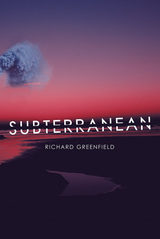
Subterranean
Richard Greenfield
Omnidawn, 2018
The elegies that comprise Richard Greenfield’s third book of poems, Subterranean, open the rhetoric of the form in new ways, creating a site of grieving that transcends a focus on the death of the father. Though lyrical, these elegies juxtapose the collapse of hyper-economies against the collapse of ecosystems, exploring the overlap, or edge effect, of liminal encounters between the living and the dead, between the city and the wilderness, between the human and the animal, and between the haves and the have nots. Greenfield creates a sequence of associative, anxious, rambling, and digressive meditations bridging these harrowing divides and exposing the loneliness of grief and empty promise of connection in the age of late capitalism. Greenfield asks, “Do you want to call someone?” The human voice, transmitted through the cell phone, becomes a spectral voice and streams “up from the basin to the peak and its antenna and striates and sieves through solid structures to arrive in the spiral of the ear of anyone.
[more]
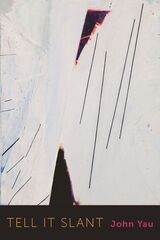
Tell it Slant
John Yau
Omnidawn, 2023
Poems that consider doubleness and truth-telling through the voice of an Asian American poet, while referencing a range of writers and pop culture figures.
Emily Dickinson begins one of her poems with the oft-quoted line, “Tell all the truth but tell it slant." For Asian Americans, the word “slant” can be heard and read two ways, as both a racializing and an obscuring term. It is this sense of doubleness—culminating in the instability of language and an untrustworthy narrator—that shapes, informs, and inflects the poems in John Yau’s new collection, all of which focus on the questions of who is speaking and who is being spoken for and to. Made up of eight sections, each exploring the idea of address—as place, as person, as memory, and as event —Tell It Slant does as Dickinson commands, but with a further twist. Yau summons spirits who help the author “tell all the truth,” among whom are reimagined traces of poets, movie stars, and science fiction writers, including Charles Baudelaire, Thomas de Quincey, Philip K. Dick, Li Shangyin, and Elsa Lanchester.
Emily Dickinson begins one of her poems with the oft-quoted line, “Tell all the truth but tell it slant." For Asian Americans, the word “slant” can be heard and read two ways, as both a racializing and an obscuring term. It is this sense of doubleness—culminating in the instability of language and an untrustworthy narrator—that shapes, informs, and inflects the poems in John Yau’s new collection, all of which focus on the questions of who is speaking and who is being spoken for and to. Made up of eight sections, each exploring the idea of address—as place, as person, as memory, and as event —Tell It Slant does as Dickinson commands, but with a further twist. Yau summons spirits who help the author “tell all the truth,” among whom are reimagined traces of poets, movie stars, and science fiction writers, including Charles Baudelaire, Thomas de Quincey, Philip K. Dick, Li Shangyin, and Elsa Lanchester.
[more]
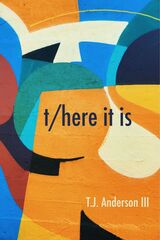
t/here it is
T.J. Anderson III
Omnidawn, 2022
A poetry collection in nine sections that each take on an aspect of memory.
The poems in t/here it is take multiple forms as each section reflects on variations of experience, engaging with the simultaneity of historic and present time while yearning for a future that is beyond what we can envision. In Section I, the poet grapples with ancestral legacy and connection to the natural world. Section II deals with the way one traverses the urban landscape and with various strategies of survival, and Section III recalls the observations and experiences of youth. Through nine linked poems, Section IV complicates the idea of witness under a capitalistic system bent on exploitation and devaluing the sacred human experience. Section V speaks to the lost opportunity of making profound human connections during the race to acquire more material goods. In Section VI, the poems take on the domestic and institutional places that govern our lives. A single poem forms Section VII, mapping the intersection between jazz and emotion. With Section VIII, Anderson pays homage to jazz greats and reflects on the ways that listening can carry one back to moments of growth and lamentation. The two poems that close out the book in Section IX bring the reader to a place of vulnerability, expressing the desire to be able to discern the multiple avenues of one’s journey with awareness.
The poems in t/here it is take multiple forms as each section reflects on variations of experience, engaging with the simultaneity of historic and present time while yearning for a future that is beyond what we can envision. In Section I, the poet grapples with ancestral legacy and connection to the natural world. Section II deals with the way one traverses the urban landscape and with various strategies of survival, and Section III recalls the observations and experiences of youth. Through nine linked poems, Section IV complicates the idea of witness under a capitalistic system bent on exploitation and devaluing the sacred human experience. Section V speaks to the lost opportunity of making profound human connections during the race to acquire more material goods. In Section VI, the poems take on the domestic and institutional places that govern our lives. A single poem forms Section VII, mapping the intersection between jazz and emotion. With Section VIII, Anderson pays homage to jazz greats and reflects on the ways that listening can carry one back to moments of growth and lamentation. The two poems that close out the book in Section IX bring the reader to a place of vulnerability, expressing the desire to be able to discern the multiple avenues of one’s journey with awareness.
[more]
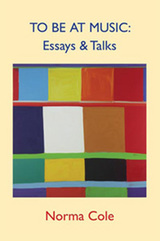
To Be At Music
Essays & Talks
Norma Cole
Omnidawn, 2010
To Be At Music is the first collection of essays by Norma Cole, who is one of our most respected poets writing in the innovative tradition, as well as an esteemed translator and visual artist. These 21 prose pieces reflect her inimitable ability to make the critical essay an art form that engages both the sensual and the cerebral, the aural and the visual, the analytic and the intuitive nature of her readers. Many of these are essays or talks written in response to invitations to discuss the works of writers and artists such as Hans Christian Andersen, Robin Blaser, Edmond Jabès, Mina Loy, Lorine Niedecker, George Oppen, Stanley Whitney, and Christa Wolf. Each offers Cole's unique appreciation of what it means to read, to interact with a work of art, to write, or to translate, and to perceive each activity as a way to attune oneself anew to the world that is both within and beyond our expected methods of understanding.
[more]
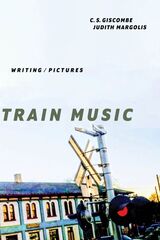
Train Music
Writing / Pictures
C.S. Giscombe and Judith Margolis
Omnidawn, 2021
A poet and a book artist take a train across the United States, creating and conversing along the way.
Late in the fall of 2017, poet C. S. Giscombe and book artist Judith Margolis boarded an Amtrak train in New York City and, four days later, stepped off another train at the edge of San Francisco Bay. Giscombe was returning home to California to address an all-white audience on the problem of white supremacy, and expatriate Margolis, accustomed to a somewhat solitary existence, was visiting the United States and making collages. Traveling together, they each turned their train quarters into writing and drawing “studios” where they engaged in conversations and arguments and shared experiences of the discomforts and failures of recent times.
Their original intention had been to travel west and document, in journals and sketchpads, the complex, charged American landscape, but as the trip progressed—and in the months afterwards—the project took on a new shape. Train Music, the book that resulted, recollects and explores the century’s racial and gendered conflicts—sometimes sensually, sometimes in stark images, sometimes in a “mixed economy” of poetry and prose.
Late in the fall of 2017, poet C. S. Giscombe and book artist Judith Margolis boarded an Amtrak train in New York City and, four days later, stepped off another train at the edge of San Francisco Bay. Giscombe was returning home to California to address an all-white audience on the problem of white supremacy, and expatriate Margolis, accustomed to a somewhat solitary existence, was visiting the United States and making collages. Traveling together, they each turned their train quarters into writing and drawing “studios” where they engaged in conversations and arguments and shared experiences of the discomforts and failures of recent times.
Their original intention had been to travel west and document, in journals and sketchpads, the complex, charged American landscape, but as the trip progressed—and in the months afterwards—the project took on a new shape. Train Music, the book that resulted, recollects and explores the century’s racial and gendered conflicts—sometimes sensually, sometimes in stark images, sometimes in a “mixed economy” of poetry and prose.
[more]
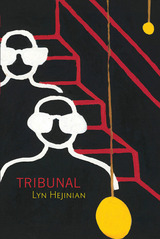
Tribunal
Lyn Hejinian
Omnidawn, 2019
The three works of poetry that constitute Tribunal were written in the current context of seemingly ubiquitous warfare and the specter of unabashed neo-fascism, ethno-nationalism, and—especially in the United States—reassertions of white supremacy. As renowned poet Lyn Hejinian recounts, the inspiration for Tribunal gradually took shape over the course of almost a decade in the collaborative work she has done to fight neoliberal policies that dismantle the public sphere through actions that include privatizing the commons, busting unions, and imposing a corporate, profiteering model on a range of institutions including public higher education. Hejinian explores a broad range of responses to our deeply troubling historical period in Tribunal’s three collections. These poems express an emotional scope that includes fury, sadness, and even, at times, something very close to pity for our humanity, perpetually unable to avoid its own penchant for cruelty. Hejinian is the rare poet who can bring to the page a rich, complex rendering of how mutually exclusive emotions can exist simultaneously. We lose safety and surety, but we gain a wider lens on contemporary crises from her sometimes lacerating, sometimes intensely beautiful lyric verse. It’s only in such an artistic and emotional landscape that readers, thinkers, artists, workers, and all comrades against injustice can manage to keep inventing, imagining, and hoping. Throughout these crises, the poet returns to language as a meaningful space in which to grapple with a seemingly endless cycle of conflict. While the works can be read as expressions of protest or dissent, they powerfully convey an argument for artmaking itself—and a turn to its affirmation of life.
[more]
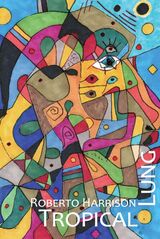
Tropical Lung
exi(s)t(s)
Roberto Harrison
Omnidawn, 2021
Tropical Lung is a collection of writings and drawings from and to a new homeland, a vision of Panamá and the Tecumseh Republic where technology is necessary for understanding the ancient, then is erased and transcended by an ever-present electronic circle. Roberto Harrison combines poetry and visual art in this surrealist vision of a world both historical and reborn, where the futuristic links to the ancient. Harrison looks to symbolic beginnings, spaces of light and mystery that counter disassociation with explorations of the foundational structures of personhood.
Tropical Lung shows how apocalypses can give us the keys to new futures and how aloneness and silence can lead us to live multidimensionally, beyond the boundaries of time and space. The screen makes itself known and offers a means of kinship, but it is also removed by song and born in the red of encounter and the dark of seven pupils. These wild visions coalesce into a fantastic vision of a future both technological and communal.
Tropical Lung shows how apocalypses can give us the keys to new futures and how aloneness and silence can lead us to live multidimensionally, beyond the boundaries of time and space. The screen makes itself known and offers a means of kinship, but it is also removed by song and born in the red of encounter and the dark of seven pupils. These wild visions coalesce into a fantastic vision of a future both technological and communal.
[more]

u&i
Cassandra Smith
Omnidawn, 2015
u&i is a meditation on the imaginary—what exists and what doesn’t, how does something exist when it knows it is imaginary, how is it to be reckoned with. u&i asks what exists when a book is written. u&i is telling a story to the things that are actual loss. Things that are gone become further proof of existence and not. u&i asks what are the can and can’t of existence, as well as the cant of existence—the domestic and repeating cant, as things circle themselves until they think they exist a little more. There is, in u&i, cant as incantation.
[more]

Underscore
Julie Carr
Omnidawn, 2024
Tender lyric poetry dedicated to two of the poet’s most influential late teachers.
Julie Carr’s deeply intimate collection, Underscore, is dedicated to two of Carr’s foundational teachers, the dancer Nancy Stark Smith and the poet Jean Valentine, both of whom died in 2020. Elegiac, tender, and at times erotic or bitter, these poems explore the passions of friendship and love for the living as well as the dead. Carr’s lyric poetry expresses the intricate many-layered relationships between individuals who are constantly shifting in their roles with one another. She considers otherness and nature while remaining deeply invested in human relationships and exploring the conflict of maintaining one’s own interiority amid a life whose backdrop is human suffering.
Reaching toward the “ghost companions in the thicket” and to the beloveds who still “pulse with activity,” Underscore’s sonically intricate poems express a longing for dynamic forces of intra-action, a sense of expanded encounter, and what Stark Smith called “overlapping kinespheres.”
Julie Carr’s deeply intimate collection, Underscore, is dedicated to two of Carr’s foundational teachers, the dancer Nancy Stark Smith and the poet Jean Valentine, both of whom died in 2020. Elegiac, tender, and at times erotic or bitter, these poems explore the passions of friendship and love for the living as well as the dead. Carr’s lyric poetry expresses the intricate many-layered relationships between individuals who are constantly shifting in their roles with one another. She considers otherness and nature while remaining deeply invested in human relationships and exploring the conflict of maintaining one’s own interiority amid a life whose backdrop is human suffering.
Reaching toward the “ghost companions in the thicket” and to the beloveds who still “pulse with activity,” Underscore’s sonically intricate poems express a longing for dynamic forces of intra-action, a sense of expanded encounter, and what Stark Smith called “overlapping kinespheres.”
[more]
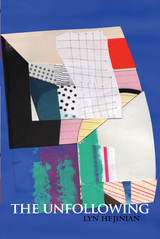
The Unfollowing
Lyn Hejinian
Omnidawn, 2016
The Unfollowing is a sequence of elegies, mourning public as well as personal loss. The grief is not coherent. Though the poems are each fourteen lines long, they are not sonnets but anti-sonnets. They are composed entirely of non sequiturs, with the intention of demonstrating, if not achieving, a refusal to follow aesthetic proprieties, and a rejection of the logic of mortality and of capitalism. Outrage, hilarity, anxiety, and ribaldry are not easily separated in the play of human emotions. And they are all the proper, anarchic medium for staying alive.
[more]
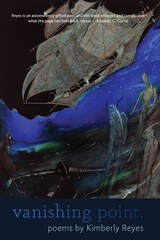
vanishing point.
Kimberly Reyes
Omnidawn, 2023
A collection by award-winning poet Kimberly Reyes that explores erased histories.
Through her latest collection, Kimberly Reyes navigates the physical, hereditary, and liminal worlds between land, time, and memory. The poems in vanishing point. take us to San Francisco, Ireland, and the Atlantic Ocean, reclaiming and examining contested space as the poet seeks to revive left-behind histories, reconsider what we see, and reveal what we cannot see.
Through her latest collection, Kimberly Reyes navigates the physical, hereditary, and liminal worlds between land, time, and memory. The poems in vanishing point. take us to San Francisco, Ireland, and the Atlantic Ocean, reclaiming and examining contested space as the poet seeks to revive left-behind histories, reconsider what we see, and reveal what we cannot see.
[more]
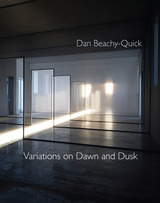
Variations on Dawn and Dusk
Dan Beachy-Quick
Omnidawn, 2019
Acting as poetic records of light, the poems in Variations on Dawn and Dusk follow the sun as it warms, cools, colors, and shifts the space of Robert Irwin’s untitled (dawn to dusk) in the desert of Marfa, TX. Built on the footprint of the town’s old hospital, Irwin’s permanent installation is a remarkable structure with walls, windows, and screens that both capture and are taken over by the sun’s changing light. Through this deeply engaged ekphrasis, Dan Beachy-Quick uses language to participate in the overpowering elegance of Irwin’s structure. The poet’s fervent observations lead us in cycles of meditation, moving with the light that slides through the surfaces of the installation. Here, the very foundation of our vision—light—forms the vocabulary from which these poems are built.
Building from Irwin’s use of rhythm and structure, the poems in this collection are constructed with an architectural framework. Rhythmic procedures inversely link the first and last words of the first and last lines of each poem and tie the number of lines to the number of syllables in the first line. These structures form a pattern, a thoughtful consistency through which we are invited to move and meditate with each variation of light.
Building from Irwin’s use of rhythm and structure, the poems in this collection are constructed with an architectural framework. Rhythmic procedures inversely link the first and last words of the first and last lines of each poem and tie the number of lines to the number of syllables in the first line. These structures form a pattern, a thoughtful consistency through which we are invited to move and meditate with each variation of light.
[more]

water/tongue
mai c. doan
Omnidawn, 2019
Grappling with the shock of her grandmother’s suicide, mai c. doan undertook a writing project that might give voice to her loss as well as to grapple with memory, and the challenge of articulation and of documentation, in all of their contradictions and (im)possibilities. In the poems that comprise water/tongue, doan conjures visceral and intuitive elements of experience to articulate the gendered and intergenerational effects of violence, colonialism, and American empire. Breaking the silence surrounding these experiences, doan conjures a host of voices dispersed across time and space to better understand the pain that haunted her family—made tragically manifest in her grandmother’s death. Looking not only to elements of Vietnamese history and culture, but to the experience of migration and racism in the United States, this book charts a path for both understanding and resistance. Indeed, doan does not merely wish to unearth the past, but also to change the future. If we want to do so, she shows, we must commune with the voices of sufferers both past and present. doan demonstrates how even the form of a work of poetry can act as a subversion of what a reader expects from the motion of the act of reading a line of type or a page of text. doan disarms and unsettles the ways a reader is led to levels of comprehension, and thus disrupts what “comprehension” might mean, as the reader follows the flow of a work, providing an opportunity to sense, and to confront hierarchies that structure ordinary reading and writing. doan brings a reader to conscious appraisal of the hierarchies that affect us, and how these hierarchies can constrain our insights and our mobility. water/tongue is a critical read for anyone interested in the long effects of gendered and cultural violence, and the power of speech to forge new and empowering directions.
[more]
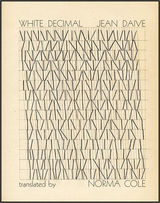
White Decimal
Jean Daive
Omnidawn, 2017
“The publication of Décimale blanche in 1967 marked a major shift in French poetry, introducing an entirely new sensibility. Fifty years later, Norma Cole’s superb new translation is no less exciting. Not only is it a masterful rendition of this classic, capturing all its spare force and uncanny grace, but it also stands in its own right as an important contribution to American poetry. White Decimal is a striking literary event, and an extremely beautiful one.” —Cole Swensen, author of Noise That Stays Noise
[more]

Whosoever Whole
Elizabeth Scanlon
Omnidawn, 2024
Poems that offer an anti-capitalist consideration of life and selfhood for women in contemporary society.
The poetry in Elizabeth Scanlon’s Whosoever Whole asks how we arrive at and nurture a sense of self amid a culture that wants us only to consume. Navigating the fractal and often fractured experiences of a citizen, a parent in the time of climate change, and a woman in an embattled era, Scanlon invites the reader into an interior space filled with anger, joy, wonder, and hope. Employing metaphor and metonymy, these poems portray a series of courageous portraits of the many faces a woman must wear to survive in today’s culture. Whosoever Whole is an anti-capitalist love song to all who refuse to be torn apart by the market valuation of their lives.
The poetry in Elizabeth Scanlon’s Whosoever Whole asks how we arrive at and nurture a sense of self amid a culture that wants us only to consume. Navigating the fractal and often fractured experiences of a citizen, a parent in the time of climate change, and a woman in an embattled era, Scanlon invites the reader into an interior space filled with anger, joy, wonder, and hope. Employing metaphor and metonymy, these poems portray a series of courageous portraits of the many faces a woman must wear to survive in today’s culture. Whosoever Whole is an anti-capitalist love song to all who refuse to be torn apart by the market valuation of their lives.
[more]
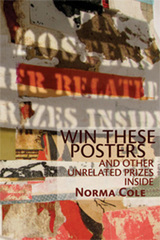
Win These Posters and Other Unrelated Prizes Inside
Norma Cole
Omnidawn, 2012
Win These Posters and Other Unrelated Prizes Inside opens with a foreword, an envoi laying out the concerns of the book. The book’s rhythmic geography tracks a shadow epic with its “1400 Facts,” aspects of feats, or anti-feats, events on the ground, but the hero/anti-hero is “you” & “I” & “we” and the narrative is “splinters of stars.” Fact/fiction, the West/Middle East, present/past, surface/depths, sound/silence— antinomies or continua? “More Facts” marks the question, “When// does the past/ begin?” What does it mean, “to be at war”? How do we measure agency or time? Compression, compassion, rigor, reduction, focus. By means of posters, messages, notices, announcements and images. The poems, linked to one another by motion, emotion, image, diction, consider questions & “facts” – what are facts? “It is the simple fact of one’s own existence as possibility or potentiality.” [Giorgio Agamben, The Coming Community Ch.11] What are dreams? The book closes with “If I’m Asleep” —don’t wake me.
[more]
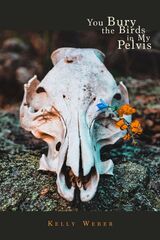
You Bury the Birds in My Pelvis
Kelly Weber
Omnidawn, 2023
Poems in a range of forms that consider the queer body, chronic illness, and love amid rural plains landscapes.
Set against a rural plains landscape of gas stations, wind, and roadkill bones littering the highways, You Bury the Birds in My Pelvis is a love letter to the nonbinary body as a site of both queer platonic intimacy and chronic illness. Looking at art and friendship, Kelly Weber’s poems imagine alternatives to x-rays, pathologizing medical settings, and other forms of harm. Considering the meeting place of radiological light and sunlit meadows, the asexual speaker’s body, and fox skeletons, these poems imagine possible forms of love. With the body caught in medical crisis and ecological catastrophe, Weber questions how to create a poetry fashioned both despite and out of endings.
You Bury the Birds in My Pelvis explores forms with plainspoken prose poems with a mix of short poems and longer lyric sections that navigate insurance systems and complicated rural relationships to queerness.
You Bury the Birds in My Pelvis is the winner of the 2022 Omnidawn 1st/2nd Poetry Book Contest, chosen by Mary Jo Bang.
Set against a rural plains landscape of gas stations, wind, and roadkill bones littering the highways, You Bury the Birds in My Pelvis is a love letter to the nonbinary body as a site of both queer platonic intimacy and chronic illness. Looking at art and friendship, Kelly Weber’s poems imagine alternatives to x-rays, pathologizing medical settings, and other forms of harm. Considering the meeting place of radiological light and sunlit meadows, the asexual speaker’s body, and fox skeletons, these poems imagine possible forms of love. With the body caught in medical crisis and ecological catastrophe, Weber questions how to create a poetry fashioned both despite and out of endings.
You Bury the Birds in My Pelvis explores forms with plainspoken prose poems with a mix of short poems and longer lyric sections that navigate insurance systems and complicated rural relationships to queerness.
You Bury the Birds in My Pelvis is the winner of the 2022 Omnidawn 1st/2nd Poetry Book Contest, chosen by Mary Jo Bang.
[more]

Yours, Purple Gallinule
Ewa Chrusciel
Omnidawn, 2022
Lyrical satire that imagines mental illnesses as various bird species.
Ewa Chrusciel’s fourth book in English, Yours, Purple Gallinule, playfully explores health and illness as they are culturally constructed. Using research into clinical understandings of mental afflictions and their treatments through history, Chrusciel maps various diagnostics onto an array of bird species. A lyrical satire, the book is a reflection on a society that tends to over-diagnose, misdiagnose, and over-medicate. These poems pose questions about what it means to be unique and to accept pain and suffering as a fact of life.
On the pages of Yours, Purple Gallinule, we encounter birds, a poet, and a psychiatrist. The psychiatrist undergoes a series of conversions as she realizes that the point is not to classify thoughtlessly, but to “make music instead”—to dwell in astonishment. Birds evade the anthropomorphizing intentions of the human protagonists as the psychiatrist and the poet eventually become one. The anthropomorphizing goes in reverse, and the human being becomes more avian. Like the dove in the biblical Noah’s ark story, the bird proclaims a new covenant, with a twig in its beak and a message: “We are all mad; some more than others, but no one is spared the affliction. And the madder we are, the more sacred.”
Ewa Chrusciel’s fourth book in English, Yours, Purple Gallinule, playfully explores health and illness as they are culturally constructed. Using research into clinical understandings of mental afflictions and their treatments through history, Chrusciel maps various diagnostics onto an array of bird species. A lyrical satire, the book is a reflection on a society that tends to over-diagnose, misdiagnose, and over-medicate. These poems pose questions about what it means to be unique and to accept pain and suffering as a fact of life.
On the pages of Yours, Purple Gallinule, we encounter birds, a poet, and a psychiatrist. The psychiatrist undergoes a series of conversions as she realizes that the point is not to classify thoughtlessly, but to “make music instead”—to dwell in astonishment. Birds evade the anthropomorphizing intentions of the human protagonists as the psychiatrist and the poet eventually become one. The anthropomorphizing goes in reverse, and the human being becomes more avian. Like the dove in the biblical Noah’s ark story, the bird proclaims a new covenant, with a twig in its beak and a message: “We are all mad; some more than others, but no one is spared the affliction. And the madder we are, the more sacred.”
[more]
READERS
Browse our collection.
PUBLISHERS
See BiblioVault's publisher services.
STUDENT SERVICES
Files for college accessibility offices.
UChicago Accessibility Resources
home | accessibility | search | about | contact us
BiblioVault ® 2001 - 2024
The University of Chicago Press




